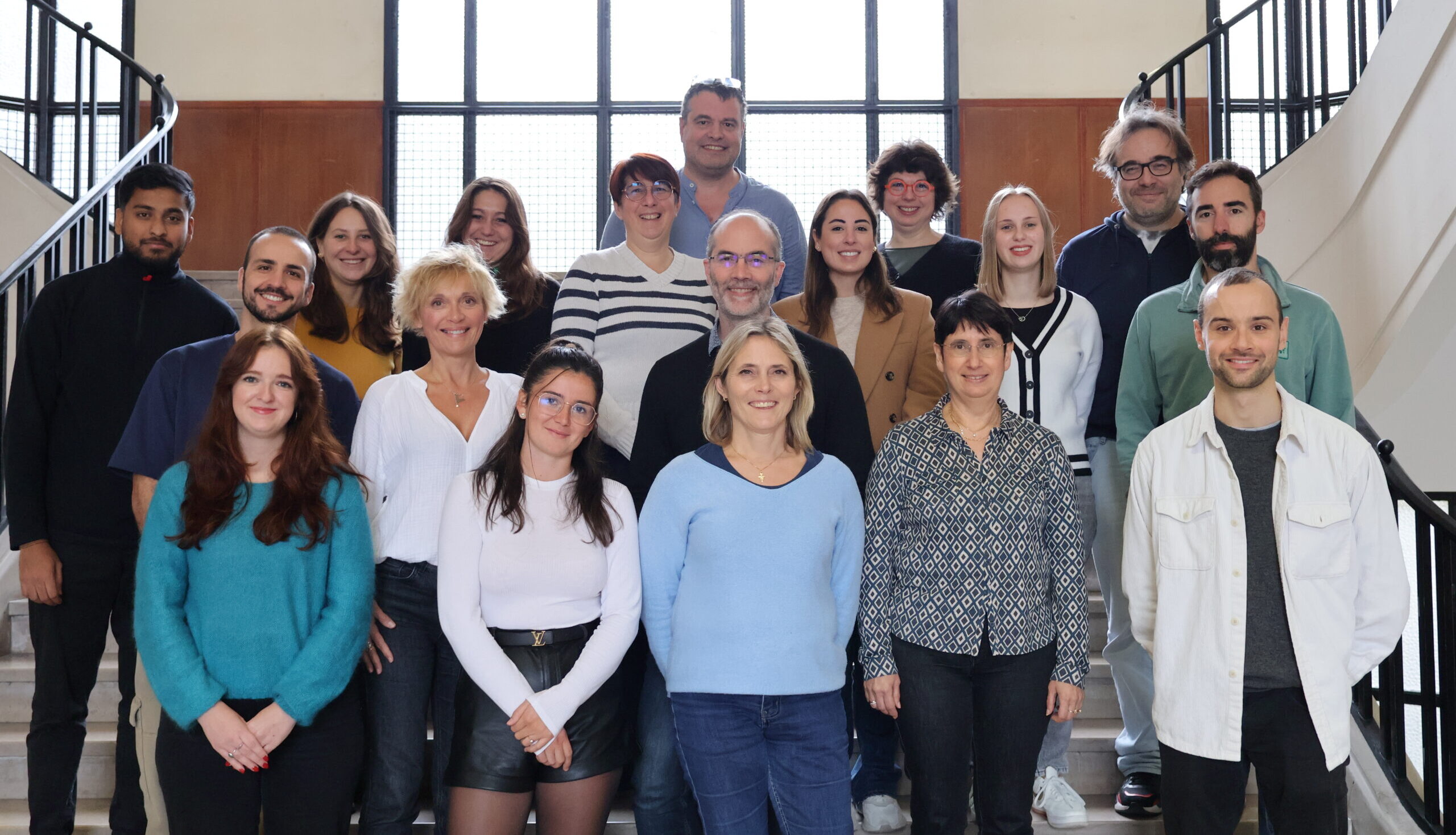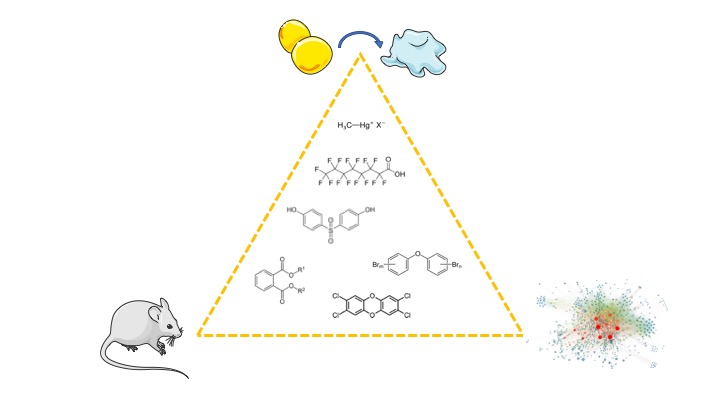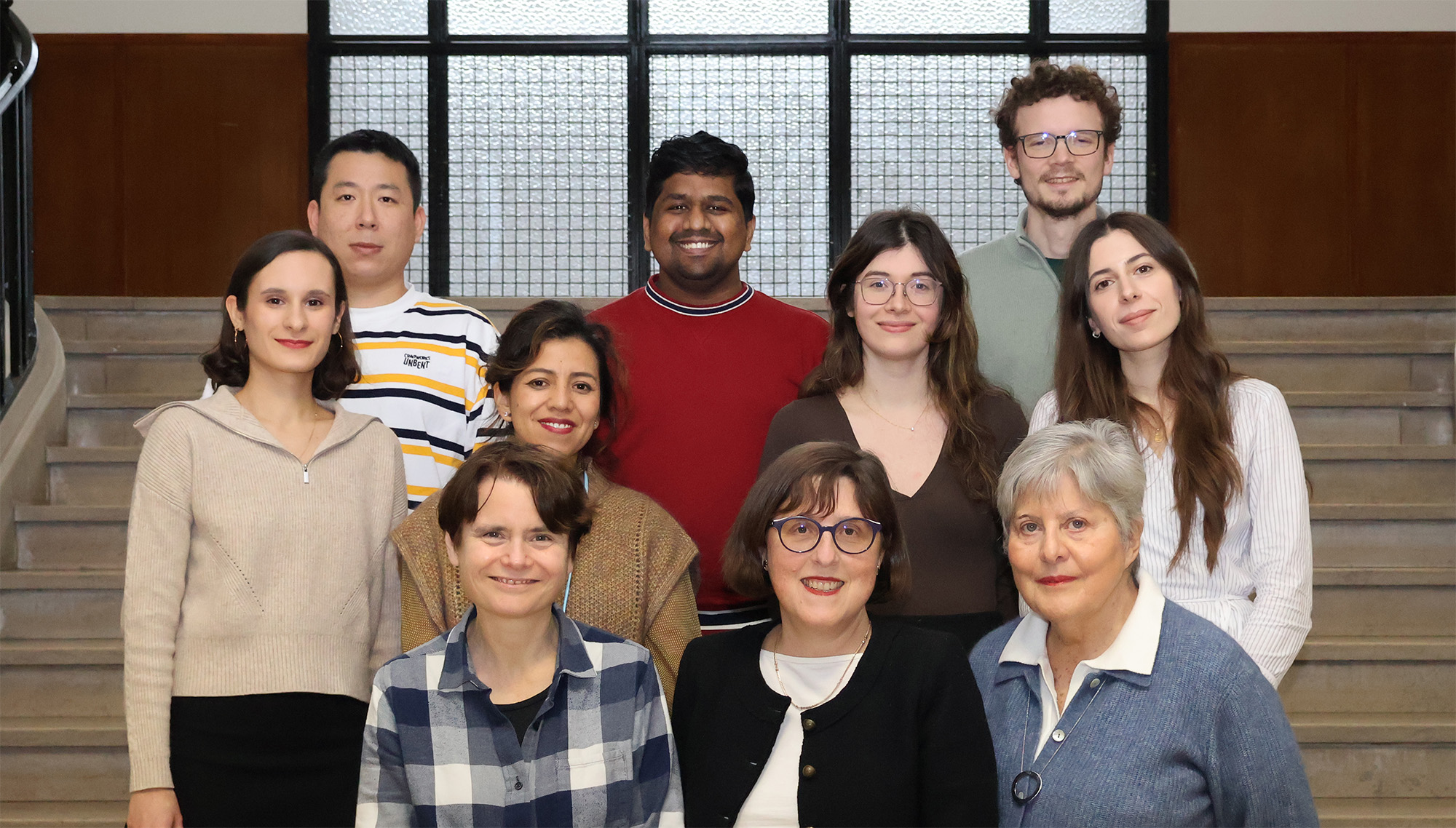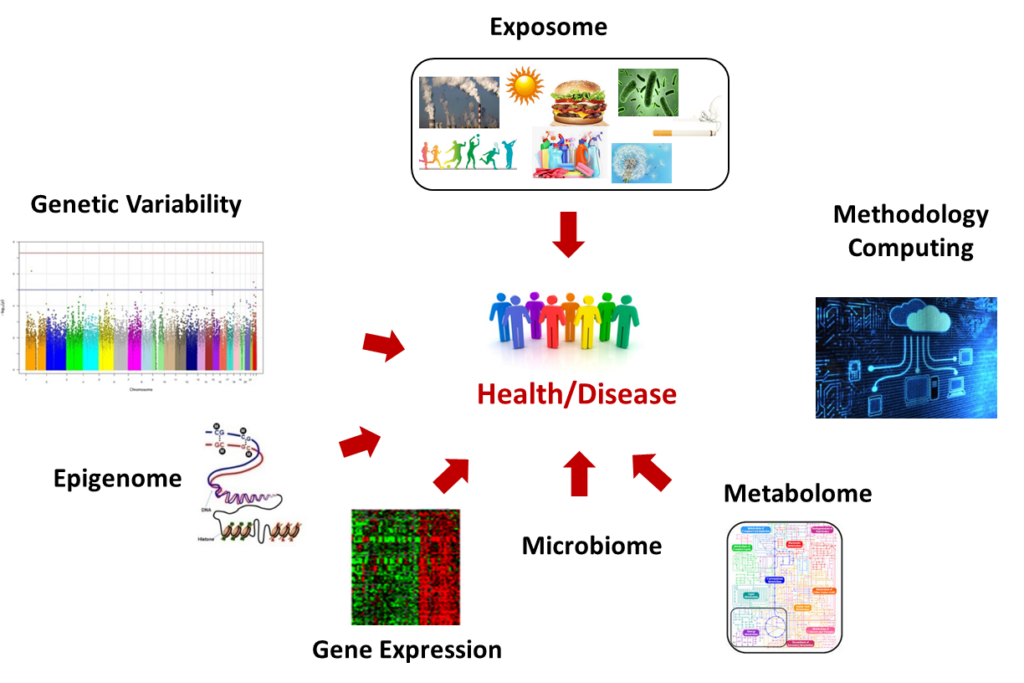Journal articles
2026
- ref_biblio
- Daniela Brenner, Kévin Bernal, Eliska Sychrova, Jiří Kohoutek, Sophie Langouët, et al.. Chemical fate in vitro: A physiological biokinetic (PBK) model for cell-based assays. ALTEX - Alternatives to Animal Experimentation, 2026, ⟨10.14573/altex.2509261⟩. ⟨hal-05456518⟩
- Accès au texte intégral et bibtex
-


2025
- ref_biblio
- Louise Benoit, German Cano-Sancho, Céline Tomkiewicz, Anne-Sophie Bats, Nathalie Douay-Hauser, et al.. Transcriptome study exploring the mechanisms linking pollutants and breast cancer aggressiveness. Scientific Reports, 2025, 15 (1), pp.41647. ⟨10.1038/s41598-025-25528-w⟩. ⟨hal-05429380⟩
- Accès au texte intégral et bibtex
-


- ref_biblio
- Thibaut Coustillet, Angela Bearth, Xavier Coumoul, Anne-Sophie Villégier, Michèle Bisson, et al.. The Cost Outcome Pathway Framework: Integrating Socio-Economic Impacts to Adverse Outcome Pathways for Supporting Policy Makers. Toxicology, 2025, 517, pp.154225. ⟨10.1016/j.tox.2025.154225⟩. ⟨hal-05132938⟩
- Accès au texte intégral et bibtex
-


- ref_biblio
- Marie Payen de la Garanderie, Nicolas Dechamp, Charlotte Verdot, Anaïs Hasenbohler, Paola Yvroud-Hoyos, et al.. Food additive mixtures in French children and adults: the nationally representative Esteban study. Scientific Reports, 2025, 15 (1), pp.44173. ⟨10.1038/s41598-025-27819-8⟩. ⟨hal-05429379⟩
- Accès au texte intégral et bibtex
-


- ref_biblio
- Séverine A Degrelle, Gaëlle Deval, Arnaud Tête, Claire Mikolajczak, Frank Giton, et al.. Cerium dioxide nanoparticles coated with benzo[a]pyrene modify aryl hydrocarbon receptor activity, trophoblast differentiation and mitochondrial network phenotype in human placenta. Particle and Fibre Toxicology, 2025, 22, ⟨10.1186/s12989-025-00640-x⟩. ⟨hal-05317901⟩
- Accès au texte intégral et bibtex
-


- ref_biblio
- Séverine A Degrelle, Gaëlle Deval, Arnaud Tête, Claire Mikolajczak, Frank Giton, et al.. Cerium dioxide nanoparticles coated with benzo[a]pyrene modify aryl hydrocarbon receptor activity, trophoblast differentiation and mitochondrial network phenotype in human placenta. Particle and Fibre Toxicology, 2025, 22 (1), pp.25. ⟨10.1186/s12989-025-00640-x⟩. ⟨hal-05318950⟩
- Accès au texte intégral et bibtex
-


- ref_biblio
- Carolina Duarte Hospital, Arnaud Tête, Kloé Debizet, Clémence Rives, Jules Imler, et al.. Triggering tumorigenic signaling: Succinate dehydrogenase inhibitor (SDHi) fungicides induce oncometabolite accumulation and metabolic shift in human colon cells. Environment International, 2025, 199, pp.109503. ⟨10.1016/j.envint.2025.109503⟩. ⟨hal-05098483⟩
- Accès au texte intégral et bibtex
-


- ref_biblio
- Chedi Erradhouani, Florian Geffroy, Benjamin Piccini, Nathalie Hinfray, Edith Chadili, et al.. A new alternative method using cyp3a65 expression in transgenic zebrafish embryos to assess metabolic endocrine-disrupting chemicals in the intestine. Environment International, 2025, 205, pp.109872. ⟨10.1016/j.envint.2025.109872⟩. ⟨ineris-05330556⟩
- Accès au texte intégral et bibtex
-


- ref_biblio
- Thomas Haarmann-Stemmann, Doreen Reichert, Xavier Coumoul, B. Paige Lawrence, Gary H Perdew, et al.. The Janus-facedness of the aryl hydrocarbon receptor pathway Report of the 6th International AHR Meeting: Research, Prevention, Therapy. Biochemical Pharmacology, 2025, 234, pp.116808. ⟨10.1016/j.bcp.2025.116808⟩. ⟨hal-05432134⟩
- Accès au texte intégral et bibtex
-


- ref_biblio
- Nicolas Mathas, Emmanuelle Braud, Erwan Galardon, Lucie Larigot, Mélanie Etheve-Quelquejeu, et al.. Park7 (DJ-1), a Parkinson-associated glyoxalase/deglycase: characterization of enzymatic activity in biological samples using fluorescence-based liquid chromatography. Biochimie, 2025, 235, pp.113-121. ⟨10.1016/j.biochi.2025.06.005⟩. ⟨hal-05343900⟩
- Accès au texte intégral et bibtex
-


- ref_biblio
- Nicolas Mathas, Emmanuelle Braud, Erwan Galardon, Lucie Larigot, Mélanie Etheve-Quelquejeu, et al.. Park7 (DJ-1), a Parkinson-associated glyoxalase/deglycase: characterization of enzymatic activity in biological samples using fluorescence-based liquid chromatography. Biochimie, 2025, 235, pp.113-121. ⟨10.1016/j.biochi.2025.06.005⟩. ⟨hal-05468192⟩
- Accès au bibtex
-

- ref_biblio
- Marie Payen de la Garanderie, Anaïs Hasenbohler, Nicolas Dechamp, Guillaume Javaux, Fabien Szabo de Edelenyi, et al.. Food additive mixtures and type 2 diabetes incidence: Results from the NutriNet-Santé prospective cohort. PLoS Medicine, 2025, pp.e1004570. ⟨10.1371/journal.pmed.1004570⟩. ⟨hal-05263362⟩
- Accès au texte intégral et bibtex
-


2024
- ref_biblio
- Damien Baudiffier, Karine Audouze, Olivier Armant, Sandrine Frelon, Sandrine Charles, et al.. Editorial trend: adverse outcome pathway (AOP) and computational strategy — towards new perspectives in ecotoxicology. Environmental Science and Pollution Research, 2024, 31 (5), pp.6587-6596. ⟨10.1007/s11356-023-30647-w⟩. ⟨hal-04296774⟩
- Accès au texte intégral et bibtex
-


- ref_biblio
- Kévin Bernal, Charbel Touma, Béatrice Le Grand, Sophie Rose Reyhan Basaran, Selenay Degerli, et al.. Assessment of endocrine disruptor impacts on lipid metabolism in a fatty acid-supplemented HepaRG human hepatic cell line. Chemosphere, 2024, Chemosphere, 349, pp.140883. ⟨10.1016/j.chemosphere.2023.140883⟩. ⟨hal-04356246⟩
- Accès au texte intégral et bibtex
-


- ref_biblio
- Alexandre Brenet, Julie Somkhit, Zsolt Csaba, Sorana Ciura, Edor Kabashi, et al.. Microglia Mitigate Neuronal Activation in a Zebrafish Model of Dravet Syndrome. Cells, 2024, 13 (8), pp.684. ⟨10.3390/cells13080684⟩. ⟨hal-04750420v5⟩
- Accès au texte intégral et bibtex
-


- ref_biblio
- Laís Cintra, Constantin Yanicostas, Nadia Soussi-Yanicostas, Claudia Vianna Maurer-Morelli. Effects of baicalin pre-treatment on pentylenetetrazole-induced seizures: Insights from zebrafish larvae locomotor behavior and neuronal calcium imaging. Epilepsy & Behavior, 2024, 157, pp.109866. ⟨10.1016/j.yebeh.2024.109866⟩. ⟨hal-04749446⟩
- Accès au texte intégral et bibtex
-


- ref_biblio
- Marvin Coleman, Dorian Sweidy, Camille Daste, Nicola Hagemeister, François Rannou, et al.. Kinematic and Neuromuscular Deficiencies PhenotypesAssociated With Patellofemoral Pain Syndrome : aCross-sectional Interventional Study Protocol. European Rehabilitation Journal, 2024, ⟨10.52057/erj.v4i1.40⟩. ⟨hal-04693458⟩
- Accès au bibtex
-

- ref_biblio
- Chedi Erradhouani, Sylvie Bortoli, Selim Aït-Aïssa, Xavier Coumoul, François Brion. Metabolic disrupting chemicals in the intestine: the need for biologically relevant models. FEBS Open Bio, 2024, 14 (9), pp.1397-1419. ⟨10.1002/2211-5463.13878⟩. ⟨ineris-04709544⟩
- Accès au texte intégral et bibtex
-


- ref_biblio
- Fun Man Fung, Etienne Blanc, Xavier Coumoul. Digital Futures of Learning Pharmacology and Medicinal and Organic Chemistry. ACS Pharmacology & Translational Science, 2024, 7 (4), pp.1191-1194. ⟨10.1021/acsptsci.4c00043⟩. ⟨hal-04668583⟩
- Accès au texte intégral et bibtex
-


- ref_biblio
- Lucas Gaillard, Robert Barouki, Etienne Blanc, Xavier Coumoul, Karine Andréau. Per- and polyfluoroalkyl substances as persistent pollutants with metabolic and endocrine-disrupting impacts. Trends in Endocrinology and Metabolism = Trends in Endocrinology & Metabolism , 2024, ⟨10.1016/j.tem.2024.07.021⟩. ⟨hal-04748588⟩
- Accès au bibtex
-

- ref_biblio
- Thomas Jaylet, Thibaut Coustillet, Nicola M Smith, Barbara Viviani, Birgitte Lindeman, et al.. Comprehensive mapping of the AOP-Wiki database: identifying biological and disease gaps. Frontiers in Toxicology, 2024, 6, pp.285768. ⟨10.3389/ftox.2024.1285768⟩. ⟨hal-04668584⟩
- Accès au texte intégral et bibtex
-


- ref_biblio
- Thomas Jaylet, Thibaut Coustillet, Nicola M Smith, Barbara Viviani, Birgitte Lindeman, et al.. Comprehensive mapping of the AOP-Wiki database: identifying biological and disease gaps. Frontiers in Toxicology, 2024, 6, pp.285768. ⟨10.3389/ftox.2024.1285768⟩. ⟨hal-04765496⟩
- Accès au bibtex
-

- ref_biblio
- Meriem Koual, Xavier Coumoul. Comment on “Application of the Key Characteristics Framework to Identify Potential Breast Carcinogens Using Publicly Available in Vivo , in Vitro , and in Silico Data”. Environmental Health Perspectives, 2024, 132 (4), pp.048004-1. ⟨10.1289/EHP14884⟩. ⟨hal-04668305⟩
- Accès au texte intégral et bibtex
-


- ref_biblio
- S. Lefevre-Arbogast, Jade Chaker, Fabien Mercier, Robert Barouki, Xavier Coumoul, et al.. Assessing the contribution of the chemical exposome to neurodegenerative disease. Nature Neuroscience, 2024, 27 (5), pp.812-821. ⟨10.1038/s41593-024-01627-1⟩. ⟨hal-04574328⟩
- Accès au texte intégral et bibtex
-


- ref_biblio
- Nesrine S Rachedi, Ying Tang, Yi-Yin Tai, Jingsi Zhao, Caroline Chauvet, et al.. Dietary intake and glutamine-serine metabolism control pathologic vascular stiffness. Cell Metabolism, 2024, 36 (6), pp.1335-1350.e8. ⟨10.1016/j.cmet.2024.04.010⟩. ⟨hal-05267388⟩
- Accès au texte intégral et bibtex
-


- ref_biblio
- Clara Salame, Guillaume Javaux, Laury Sellem, Emilie Viennois, Fabien Szabo de Edelenyi, et al.. Food additive emulsifiers and the risk of type 2 diabetes: analysis of data from the NutriNet-Santé prospective cohort study. The Lancet. Diabetes & Endocrinology , 2024, 12 (5), pp.339-349. ⟨10.1016/S2213-8587(24)00086-X⟩. ⟨hal-04668298⟩
- Accès au texte intégral et bibtex
-


- ref_biblio
- Laury Sellem, Bernard Srour, Guillaume Javaux, Eloi Chazelas, Benoit Chassaing, et al.. Food additive emulsifiers and cancer risk: Results from the French prospective NutriNet-Santé cohort. PLoS Medicine, 2024, 21 (2), pp.e1004338. ⟨10.1371/journal.pmed.1004338⟩. ⟨hal-04669207⟩
- Accès au texte intégral et bibtex
-


- ref_biblio
- Céline Tomkiewicz, Xavier Coumoul, Pierre Nioche, Robert Barouki, Etienne B Blanc. Costs of molecular adaptation to the chemical exposome: a focus on xenobiotic metabolism pathways. Philosophical Transactions of the Royal Society B: Biological Sciences, 2024, 379 (1898), pp.20220510. ⟨10.1098/rstb.2022.0510⟩. ⟨hal-04669203⟩
- Accès au texte intégral et bibtex
-


- ref_biblio
- Stéphanie Torrino, William Oldham, Andrés Tejedor, Ignacio Burgos, Lara Nasr, et al.. Mechano-dependent sorbitol accumulation supports biomolecular condensate. Cell, 2024, 188 (2), pp.447-464. ⟨10.1016/j.cell.2024.10.048⟩. ⟨hal-04841401⟩
- Accès au bibtex
-

2023
- ref_biblio
- Robert Barouki, Michel Samson, Etienne B Blanc, Massimo Colombo, Jessica Zucman-Rossi, et al.. The exposome and liver disease - how environmental factors affect liver health. Journal of Hepatology, 2023, 79 (2), pp.492-505. ⟨10.1016/j.jhep.2023.02.034⟩. ⟨hal-04041202⟩
- Accès au texte intégral et bibtex
-


- ref_biblio
- Louise Benoit, Celine Tomkiewicz, Maxime Delit, Hanna Khider, Karine Audouze, et al.. Cigarette smoke and tumor micro-environment co-promote aggressiveness of human breast cancer cells. Toxicological Sciences, 2023, 192 (1), pp.30-42. ⟨10.1093/toxsci/kfad013⟩. ⟨hal-04669216⟩
- Accès au texte intégral et bibtex
-


- ref_biblio
- Germán Cano-Sancho, Charline Warembourg, Nuria Güil, Nikos Stratakis, Aitana Lertxundi, et al.. Nutritional Modulation of Associations between Prenatal Exposure to Persistent Organic Pollutants and Childhood Obesity: A Prospective Cohort Study. Environmental Health Perspectives, 2023, 131 (3), pp.037011. ⟨10.1289/EHP11258⟩. ⟨hal-04038167⟩
- Accès au texte intégral et bibtex
-


- ref_biblio
- Thibault Crouzet, Elise Grignard, François Brion, Etienne B Blanc, Normand Podechard, et al.. ReadEDTest: A tool to assess the readiness of in vitro test methods under development for identifying endocrine disruptors. Environment International, 2023, 174, pp.107910. ⟨10.1016/j.envint.2023.107910⟩. ⟨hal-04094681⟩
- Accès au texte intégral et bibtex
-


- ref_biblio
- Norma David, Jean-Philippe Antignac, Marine Roux, Philippe Marchand, Sophie Michalak, et al.. Associations between perfluoroalkyl substances and the severity of non-alcoholic fatty liver disease. Environment International, 2023, 180, pp.108235. ⟨10.1016/j.envint.2023.108235⟩. ⟨hal-04382856⟩
- Accès au texte intégral et bibtex
-


- ref_biblio
- Thalia de Castelbajac, Kiara Aiello, Celia Garcia Arenas, Terje Svingen, Louise Ramhøj, et al.. Innovative tools and methods for toxicity testing within PARC work package 5 on hazard assessment. Frontiers in Toxicology, 2023, 5, pp.1216369. ⟨10.3389/ftox.2023.1216369⟩. ⟨anses-04193760⟩
- Accès au texte intégral et bibtex
-


- ref_biblio
- Gaelle Deval, Margaux Nedder, Séverine Degrelle, Jasmina Rogozarski, Marie-Léone Vignaud, et al.. Benzo(a)pyrene and Cerium Dioxide Nanoparticles in Co-Exposure Impair Human Trophoblast Cell Stress Signaling. International Journal of Molecular Sciences, 2023, 24 (6), pp.5439. ⟨10.3390/ijms24065439⟩. ⟨hal-04030539⟩
- Accès au texte intégral et bibtex
-


- ref_biblio
- Carolina Duarte Hospital, Arnaud Tête, Kloé Debizet, Jules Imler, Céline Tomkiewicz-Raulet, et al.. SDHi fungicides: An example of mitotoxic pesticides targeting the succinate dehydrogenase complex. Environment International, 2023, 180, pp.108219. ⟨10.1016/j.envint.2023.108219⟩. ⟨hal-04748812⟩
- Accès au bibtex
-

- ref_biblio
- Carolina Duarte Hospital, Arnaud Tête, Kloé Debizet, Jules Imler, Céline Tomkiewicz-Raulet, et al.. SDHi fungicides: An example of mitotoxic pesticides targeting the succinate dehydrogenase complex. Environment International, 2023, 180, pp.108219. ⟨10.1016/j.envint.2023.108219⟩. ⟨hal-04627140⟩
- Accès au texte intégral et bibtex
-


- ref_biblio
- Gideon Lam, Phillipe Noirez, Haidar Djemai, Layale Youssef, Etienne Blanc, et al.. The effects of pollutant mixture released from grafted adipose tissues on fatty acid and lipid metabolism in the skeletal muscles, kidney, heart, and lungs of male mice. Environmental Pollution, 2023, 336, pp.122387. ⟨10.1016/j.envpol.2023.122387⟩. ⟨hal-04182516⟩
- Accès au bibtex
-

- ref_biblio
- Patricia Margaritte-Jeannin, Raphaël Vernet, Ashley Budu-Aggrey, Markus Ege, Anne-Marie Madore, et al.. TNS1 and NRXN1 Genes Interacting With Early-Life Smoking Exposure in Asthma-Plus-Eczema Susceptibility. Allergy, Asthma & Immunology Research, 2023, 15, ⟨10.4168/aair.2023.15.6.779⟩. ⟨hal-04426636⟩
- Accès au texte intégral et bibtex
-


- ref_biblio
- Meg-Anne Moriceau, Germán Cano-Sancho, Minji Kim, Xavier Coumoul, Claude Emond, et al.. Partitioning of Persistent Organic Pollutants between Adipose Tissue and Serum in Human Studies. Toxics, 2023, 11 (1), pp.41. ⟨10.3390/toxics11010041⟩. ⟨anses-03920954⟩
- Accès au texte intégral et bibtex
-


- ref_biblio
- Gary H Perdew, Charlotte Esser, Megan Snyder, David H Sherr, Ellen H van den Bogaard, et al.. The Ah Receptor from Toxicity to Therapeutics: Report from the 5th AHR Meeting at Penn State University, USA, June 2022. International Journal of Molecular Sciences, 2023, 24 (6), pp.5550. ⟨10.3390/ijms24065550⟩. ⟨hal-04669215⟩
- Accès au texte intégral et bibtex
-


- ref_biblio
- Marion Rolland, Emmanuel Oger, Monica Dinulescu, Thierry Lesimple, David Russo, et al.. French dermatologists' opinions and practices with regard to adjuvant therapy in stage III melanoma. JEADV Clinical Practice, 2023, Jeadv Clinical Practice, 2 (4), pp.708-717. ⟨10.1002/jvc2.195⟩. ⟨hal-04357721⟩
- Accès au bibtex
-

- ref_biblio
- Laury Sellem, Bernard Srour, Guillaume Javaux, Eloi Chazelas, Benoit Chassaing, et al.. Food additive emulsifiers and risk of cardiovascular disease in the NutriNet-Santé cohort: prospective cohort study. BMJ - British Medical Journal, 2023, 382, pp.e076058. ⟨10.1136/bmj-2023-076058⟩. ⟨hal-04205056⟩
- Accès au texte intégral et bibtex
-


- ref_biblio
- Amir Shadboorestan, Meriem Koual, Julien Dairou, Xavier Coumoul. The Role of the Kynurenine/AhR Pathway in Diseases Related to Metabolism and Cancer. International Journal of Tryptophan Research, 2023, 16, ⟨10.1177/11786469231185102⟩. ⟨hal-04669206⟩
- Accès au texte intégral et bibtex
-


2022
- ref_biblio
- Kévin Bernal, Charbel Touma, Chedi Erradhouani, Talía Boronat-Belda, Lucas Gaillard, et al.. Combinatorial pathway disruption is a powerful approach to delineate metabolic impacts of endocrine disruptors. FEBS Letters, 2022, Lisbon Virtual Issue Reviews, 596 (24), pp.3107-3123. ⟨10.1002/1873-3468.14465⟩. ⟨hal-04765488⟩
- Accès au texte intégral et bibtex
-


- ref_biblio
- Vanessa Brinkmann, Margherita Romeo, Lucie Larigot, Anne Hemmers, Lisa Tschage, et al.. Aryl Hydrocarbon Receptor-Dependent and -Independent Pathways Mediate Curcumin Anti-Aging Effects. Antioxidants , 2022, 11 (4), pp.613. ⟨10.3390/antiox11040613⟩. ⟨hal-03745302⟩
- Accès au texte intégral et bibtex
-


- ref_biblio
- Jean-Pascal de Bandt, Xavier Coumoul, Robert Barouki. Branched-chain amino acids and insulin resistance, from protein supply to diet-induced obesity. Nutrients, 2022, 15 (1), pp.68. ⟨10.3390/nu15010068⟩. ⟨hal-04669217⟩
- Accès au texte intégral et bibtex
-


- ref_biblio
- Jerrold J Heindel, Sarah Howard, Keren Agay-Shay, Juan P Arrebola, Karine Audouze, et al.. Obesity II: Establishing causal links between chemical exposures and obesity. Biochemical Pharmacology, 2022, 199, pp.115015. ⟨10.1016/j.bcp.2022.115015⟩. ⟨hal-03705630⟩
- Accès au texte intégral et bibtex
-


- ref_biblio
- Marguerite Kandel, Aurélie Bardet, Stéphane Dalle, Clara Allayous, Laurent Mortier, et al.. Cost-Effectiveness Analysis of Sequential Treatment Strategies for Advanced Melanoma in Real Life in France. Current Oncology, 2022, 29 (12), pp.9255-9270. ⟨10.3390/curroncol29120725⟩. ⟨hal-04049403⟩
- Accès au texte intégral et bibtex
-


- ref_biblio
- Gideon Lam, Ludmila Juricek, Hiranya Dayal, Anna Karen Carrasco Laserna, Medhi Hichor, et al.. Toxicological effects of 2,3,7,8 tetrachlorodibenzo-p-dioxin on the skeletal muscle of mice during the perinatal period: a metabolomics study. Environmental Sciences Europe , 2022, 34 (1), pp.57. ⟨10.1186/s12302-022-00633-z⟩. ⟨hal-04182519⟩
- Accès au texte intégral et bibtex
-


- ref_biblio
- Lucie Larigot, Daniel Mansuy, Ilona Borowski, Xavier Coumoul, Julien Dairou. Cytochromes P450 of Caenorhabditis elegans: Implication in Biological Functions and Metabolism of Xenobiotics. Biomolecules, 2022, 12 (3), pp.342. ⟨10.3390/biom12030342⟩. ⟨hal-03745295⟩
- Accès au texte intégral et bibtex
-


- ref_biblio
- Lucie Larigot, Louise Benoit, Meriem Koual, Céline Tomkiewicz, Robert Barouki, et al.. Aryl Hydrocarbon Receptor and Its Diverse Ligands and Functions: An Exposome Receptor. Annual Review of Pharmacology and Toxicology, 2022, 62 (1), pp.383-404. ⟨10.1146/annurev-pharmtox-052220-⟩. ⟨hal-03745292⟩
- Accès au texte intégral et bibtex
-


- ref_biblio
- Lucie Larigot, Linh-Chi Bui, Marine de Bouvier, Ophélie Pierre, Grégory Pinon, et al.. Identification of Modulators of the C. elegans Aryl Hydrocarbon Receptor and Characterization of Transcriptomic and Metabolic AhR-1 Profiles. Antioxidants , 2022, 11 (5), pp.1030. ⟨10.3390/antiox11051030⟩. ⟨hal-03745310⟩
- Accès au texte intégral et bibtex
-


- ref_biblio
- Lorena Lopez-Suarez, Sana Al Awabdh, Xavier Coumoul, Caroline Chauvet. The SH-SY5Y human neuroblastoma cell line, a relevant in vitro cell model for investigating neurotoxicology in human: focus on organic pollutants. NeuroToxicology, In press, ⟨10.1016/j.neuro.2022.07.008⟩. ⟨hal-03745319⟩
- Accès au texte intégral et bibtex
-


- ref_biblio
- Robert Lustig, David Collier, Christopher Kassotis, Troy Roepke, Min Ji Kim, et al.. Obesity I: Overview and molecular and biochemical mechanisms. Biochemical Pharmacology, 2022, 199, pp.115012. ⟨10.1016/j.bcp.2022.115012⟩. ⟨hal-03843296⟩
- Accès au bibtex
-

- ref_biblio
- Vivek Shukla, Xavier Coumoul, Tyler Lahusen, Rui-Hong Wang, Xiaoling Xu, et al.. BRCA1 affects global DNA methylation through regulation of DNMT1. Cell Research, 2022, 20 (11), pp.1201 - 1215. ⟨10.1038/cr.2010.128⟩. ⟨hal-05440350⟩
- Accès au texte intégral et bibtex
-


- ref_biblio
- Julie Somkhit, Constantin Yanicostas, Nadia Soussi-Yanicostas. Microglia Remodelling and Neuroinflammation Parallel Neuronal Hyperactivation Following Acute Organophosphate Poisoning. International Journal of Molecular Sciences, 2022, 23 (15), pp.8240. ⟨10.3390/ijms23158240⟩. ⟨hal-03873288⟩
- Accès au texte intégral et bibtex
-


- ref_biblio
- Nadia Soussi-Yanicostas. Zebrafish as a Model for Neurological Disorders. International Journal of Molecular Sciences, 2022, 23 (8), pp.4321. ⟨10.3390/ijms23084321⟩. ⟨hal-03738788⟩
- Accès au texte intégral et bibtex
-


- ref_biblio
- Arnaud Tete, Elias Zgheib, Sana Al Awabdh, Louise Benoit, Kévin Bernal, et al.. Alternatives in vitro et in silico aux modèles animaux en toxicologie. Nanotechnologies et biotechnologies pour la santé, 2022, ⟨10.51257/a-v1-re295⟩. ⟨hal-04627223⟩
- Accès au bibtex
-

- ref_biblio
- Arnaud Tete, Elias Zgheib, Sana Al Awabdh, Louise Benoit, Kévin Bernal, et al.. Alternatives in vitro et in silico aux modèles animaux en toxicologie. Nanotechnologies et biotechnologies pour la santé, 2022, ⟨10.51257/a-v1-re295⟩. ⟨hal-04765585⟩
- Accès au bibtex
-

- ref_biblio
- Manon Watzky, Solène Huard, Ludmila Juricek, Julien Dairou, Caroline Chauvet, et al.. Hexokinase 2 is a transcriptional target and a positive modulator of AHR signalling. Nucleic Acids Research, 2022, 50 (10), pp.5545 - 5564. ⟨10.1093/nar/gkac360⟩. ⟨hal-03745312⟩
- Accès au texte intégral et bibtex
-


2021
- ref_biblio
- Robert Barouki, Karine Audouze, Xavier Coumoul. Perturbateurs endocriniens : de quoi parle-t-on, et quels nouveaux mécanismes de toxicité mettent-ils en jeu ?. La Revue du Praticien Médecine Générale, 2021, 71 (7), pp.723-726. ⟨hal-03744691⟩
- Accès au texte intégral et bibtex
-


- ref_biblio
- Eloi Chazelas, Nathalie Druesne-Pecollo, Younes Esseddik, Fabien Szabo de Edelenyi, Cédric Agaesse, et al.. Exposure to food additive mixtures in 106,000 French adults from the NutriNet-Santé cohort. Scientific Reports, 2021, 11 (1), ⟨10.1038/s41598-021-98496-6⟩. ⟨hal-03376892⟩
- Accès au texte intégral et bibtex
-


- ref_biblio
- Maria João Correia, António Pimpão, Filipa Lopes-Coelho, Catarina Sequeira, Nuno Coelho, et al.. Aryl Hydrocarbon Receptor and Cysteine Redox Dynamics Underlie (Mal)adaptive Mechanisms to Chronic Intermittent Hypoxia in Kidney Cortex. Antioxidants , 2021, 10 (9), pp.1484. ⟨10.3390/antiox10091484⟩. ⟨hal-03744708⟩
- Accès au texte intégral et bibtex
-


- ref_biblio
- Xavier Coumoul. Les effets des co-expositions du BaP avec des nanoparticules. Les cahiers de la Recherche : Santé, Environnement, Travail, 2021, Microplastiques et nanomatériaux, 17, pp.14-16. ⟨anses-03348846⟩
- Accès au texte intégral et bibtex
-


- ref_biblio
- Carolina Duarte-Hospital, Arnaud Tête, François Brial, Louise Benoit, Meriem Koual, et al.. Mitochondrial Dysfunction as a Hallmark of Environmental Injury. Cells, 2021, 11 (1), pp.110. ⟨10.3390/cells11010110⟩. ⟨hal-03744739⟩
- Accès au texte intégral et bibtex
-


- ref_biblio
- Carolina Duarte-Hospital, Arnaud Tête, François Brial, Louise Benoit, Meriem Koual, et al.. Mitochondrial Dysfunction as a Hallmark of Environmental Injury. Cells, 2021, 11 (1), pp.110. ⟨10.3390/cells11010110⟩. ⟨hal-04627137⟩
- Accès au bibtex
-

- ref_biblio
- Arnaud Dupeyron, Patricia Ribinik, François Rannou, Sarah Kabani, Christophe Demoulin, et al.. Rehabilitation and lumbar surgery: the French recommendations for clinical practice. Annals of Physical and Rehabilitation Medicine, 2021, 64 (6), pp.101548. ⟨10.1016/j.rehab.2021.101548⟩. ⟨hal-03633849⟩
- Accès au texte intégral et bibtex
-


- ref_biblio
- Jérôme Estaquier, Étienne Blanc, Xavier Coumoul. Que sait-on de l’action des perturbateurs endocriniens sur le système immunitaire ?. La Revue du Praticien Médecine Générale, 2021, 71 (7), pp.729-734. ⟨hal-03744699⟩
- Accès au texte intégral et bibtex
-


- ref_biblio
- Marion Falabrègue, Anne-Claire Boschat, Romain Jouffroy, Marieke Derquennes, Haidar Djemai, et al.. Lack of Skeletal Muscle Serotonin Impairs Physical Performance. International Journal of Tryptophan Research, 2021, 14, ⟨10.1177/11786469211003109⟩. ⟨hal-04668295⟩
- Accès au texte intégral et bibtex
-


- ref_biblio
- Isabelle Hernandez, Audrey Chissey, Jean Guibourdenche, Roger Atasoy, Xavier Coumoul, et al.. Human Placental NADPH Oxidase Mediates sFlt-1 and PlGF Secretion in Early Pregnancy: Exploration of the TGF-β1/p38 MAPK Pathways. Antioxidants , 2021, 10 (2), pp.281. ⟨10.3390/antiox10020281⟩. ⟨hal-03741281⟩
- Accès au texte intégral et bibtex
-


- ref_biblio
- Candice Hober, Lisa Fredeau, Anne Pham-Ledard, Marouane Boubaya, Florian Herms, et al.. Cemiplimab for locally advanced and metastatic cutaneous squamous-cell carcinomas: Real-life experience from the French CAREPI study group. Cancers, 2021, 13 (14), 14 p. ⟨10.3390/cancers13143547⟩. ⟨hal-03332168⟩
- Accès au texte intégral et bibtex
-


- ref_biblio
- Meriem Koual, Céline Tomkiewicz, Ida Chiara Guerrera, David Sherr, Robert Barouki, et al.. Aggressiveness and Metastatic Potential of Breast Cancer Cells Co-Cultured with Preadipocytes and Exposed to an Environmental Pollutant Dioxin: An in Vitro and in Vivo Zebrafish Study. Environmental Health Perspectives, 2021, 129 (3), ⟨10.1289/ehp7102⟩. ⟨hal-03741287⟩
- Accès au texte intégral et bibtex
-


- ref_biblio
- Patricia Margaritte-Jeannin, Ashley Budu-Aggrey, Markus Ege, Anne‐marie Madore, Christophe Linhard, et al.. Identification of OCA2 as a novel locus for the co‐morbidity of asthma‐plus‐eczema. Clinical and Experimental Allergy, 2021, 52 (1), pp.70-81. ⟨10.1111/cea.13972⟩. ⟨hal-04424386⟩
- Accès au bibtex
-

- ref_biblio
- Clémence Maupu, Julie Enderlin, Alexandre Igert, Myriam Oger, Stéphane Auvin, et al.. Diisopropylfluorophosphate-induced status epilepticus drives complex glial cell phenotypes in adult male mice. Neurobiology of Disease, 2021, 152, pp.105276. ⟨10.1016/j.nbd.2021.105276⟩. ⟨hal-03271712⟩
- Accès au texte intégral et bibtex
-


- ref_biblio
- Constantin Yanicostas, Nadia Soussi-Yanicostas. SDHI Fungicide Toxicity and Associated Adverse Outcome Pathways: What Can Zebrafish Tell Us?. International Journal of Molecular Sciences, 2021, 22 (22), pp.12362. ⟨10.3390/ijms222212362⟩. ⟨hal-03433483⟩
- Accès au texte intégral et bibtex
-


- ref_biblio
- Constantin Yanicostas, Nadia Soussi-Yanicostas. SDHI Fungicide Toxicity and Associated Adverse Outcome Pathways: What Can Zebrafish Tell Us?. International Journal of Molecular Sciences, 2021, 22 (22), ⟨10.3390/ijms222212362⟩. ⟨hal-03451260⟩
- Accès au texte intégral et bibtex
-


2020
- ref_biblio
- Jonah Kailer Aw, Kevin Christopher Boellaard, Teck Kiang Tan, John Yap, Yi Ping Loh, et al.. Interacting with Three-Dimensional Molecular Structures Using an Augmented Reality Mobile App. Journal of Chemical Education, 2020, 97 (10), pp.3877-3881. ⟨10.1021/acs.jchemed.0c00387⟩. ⟨hal-03154348⟩
- Accès au bibtex
-

- ref_biblio
- Sylvie Babajko, Véronique V. Gayrard-Troy, Sophia Houari, Ai Thu Bui, Robert Barouki, et al.. La sphère orale, cible et marqueur de l’exposition environnementale. Médecine/Sciences, 2020, 36 (3), pp.225-230. ⟨10.1051/medsci/2020024⟩. ⟨hal-02617147⟩
- Accès au texte intégral et bibtex
-


- ref_biblio
- Sylvie Babajko, Géraldine Lescaille, Loredana Radoi, Ai Thu Bui, Vanessa Baaroun, et al.. La sphère orale, cible et marqueur de l’exposition environnementaleII. Maladies diagnostiquées chez l'adulte. Médecine/Sciences, 2020, 36 (3), pp.231-234. ⟨10.1051/medsci/2020025⟩. ⟨hal-02559671⟩
- Accès au texte intégral et bibtex
-


- ref_biblio
- David Balakirouchenane, Sarah Guégan, Chantal Csajka, Anne Jouinot, Valentine Heidelberger, et al.. Population Pharmacokinetics/Pharmacodynamics of Dabrafenib Plus Trametinib in Patients with BRAF-Mutated Metastatic Melanoma. Cancers, 2020, 12 (4), pp.931. ⟨10.3390/cancers12040931⟩. ⟨hal-05409816⟩
- Accès au texte intégral et bibtex
-


- ref_biblio
- Alexandre Brenet, Rahma Hassan-Abdi, Nadia Soussi-Yanicostas. Bixafen, a succinate dehydrogenase inhibitor fungicide, causes microcephaly and motor neuron axon defects during development. Chemosphere, 2020, pp.128781. ⟨10.1016/j.chemosphere.2020.128781⟩. ⟨inserm-03058531⟩
- Accès au texte intégral et bibtex
-


- ref_biblio
- Alexandre Brenet, Julie Somkhit, Rahma Hassan-Abdi, Constantin Yanicostas, Christiane Romain, et al.. Organophosphorus diisopropylfluorophosphate (DFP) intoxication in zebrafish larvae causes behavioral defects, neuronal hyperexcitation and neuronal death. Scientific Reports, 2020, 10 (1), pp.19228. ⟨10.1038/s41598-020-76056-8⟩. ⟨inserm-03058521⟩
- Accès au texte intégral et bibtex
-


- ref_biblio
- Alexandre Brenet, Julie Somkhit, Rahma Hassan-Abdi, Nadia Soussi-Yanicostas, Christiane Romain, et al.. Organophosphorus diisopropylfluorophosphate (DFP) intoxication in zebrafish larvae causes behavioral defects, neuronal hyperexcitation and neuronal death. Scientific Reports, 2020, 10 (1), ⟨10.1038/s41598-020-76056-8⟩. ⟨hal-03449176⟩
- Accès au bibtex
-

- ref_biblio
- Sandra Huynh, Laurent Mortier, Caroline Dutriaux, Eve Maubec, Marie Boileau, et al.. Combined Therapy with Anti-PD1 and BRAF and/or MEK Inhibitor for Advanced Melanoma: A Multicenter Cohort Study. Cancers, 2020, 12 (6), pp.1666. ⟨10.3390/cancers12061666⟩. ⟨hal-03257701⟩
- Accès au texte intégral et bibtex
-


- ref_biblio
- Meriem Koual, Céline Tomkiewicz, Germán Cano-Sancho, Jean-Philippe Antignac, Anne-Sophie Bats, et al.. Environmental chemicals, breast cancer progression and drug resistance. Environmental Health, 2020, 19 (1), ⟨10.1186/s12940-020-00670-2⟩. ⟨hal-03182397⟩
- Accès au texte intégral et bibtex
-


- ref_biblio
- Bo Li, Yongliang Li, Céline Tomkiewicz-Raulet, Pascal Dao, Daniel Lietha, et al.. Design, Synthesis, and Biological Evaluation of Covalent Inhibitors of Focal Adhesion Kinase (FAK) against Human Malignant Glioblastoma. Journal of Medicinal Chemistry, 2020, 63 (21), pp.12707-12724. ⟨10.1021/acs.jmedchem.0c01059⟩. ⟨hal-05437532⟩
- Accès au texte intégral et bibtex
-


- ref_biblio
- Julie Somkhit, Roxane Loyant, Alexandre Brenet, Rahma Hassan-Abdi, Constantin Yanicostas, et al.. A Fast, Simple, and Affordable Technique to Measure Oxygen Consumption in Living Zebrafish Embryos. Zebrafish, 2020, 17 (4), pp.268-270. ⟨10.1089/zeb.2020.1878⟩. ⟨hal-03097083⟩
- Accès au texte intégral et bibtex
-


2019
- ref_biblio
- Barbara Allen, Xavier Coumoul, Silvia Lacorte. Microplastic freshwater contamination: an issue advanced by science with public engagement. Environmental Science and Pollution Research, 2019, ⟨10.1007/s11356-019-05300-0⟩. ⟨hal-02122843⟩
- Accès au texte intégral et bibtex
-


- ref_biblio
- Alexandre Brenet, Rahma Hassan-Abdi, Julie Somkhit, Constantin Yanicostas, Nadia Soussi-Yanicostas. Defective Excitatory/Inhibitory Synaptic Balance and Increased Neuron Apoptosis in a Zebrafish Model of Dravet Syndrome. Cells, 2019, 8 (10), pp.1199. ⟨10.3390/cells8101199⟩. ⟨hal-02357182⟩
- Accès au texte intégral et bibtex
-


- ref_biblio
- Jean-Charles Carvaillo, Robert Barouki, Xavier Coumoul, Karine Audouze. Linking Bisphenol S to Adverse Outcome Pathways Using a Combined Text Mining and Systems Biology Approach. Environmental Health Perspectives, 2019, 127 (4), pp.047005. ⟨10.1289/ehp4200⟩. ⟨hal-02196330⟩
- Accès au texte intégral et bibtex
-


- ref_biblio
- Xavier Coumoul, Rémi Servien, Ludmila Juricek, Yael Kaddouch-Amar, Yannick Lippi, et al.. The GMO90+ Project: Absence of Evidence for Biologically Meaningful Effects of Genetically Modified Maize-based Diets on Wistar Rats After 6-Months Feeding Comparative Trial. Toxicological Sciences, 2019, 168 (2), pp.315-338. ⟨10.1093/toxsci/kfy298⟩. ⟨hal-02196332⟩
- Accès au texte intégral et bibtex
-


- ref_biblio
- Carolina Duarte-Hospital, Laurence Huc, Sylvie Bortoli, Xavier Coumoul. Les xénobiotiques, quel impact sur les maladies métaboliques ?. Cahiers de Nutrition et de Diététique, 2019, 54 (5), pp.286-293. ⟨10.1016/j.cnd.2019.07.002⟩. ⟨hal-02618196⟩
- Accès au texte intégral et bibtex
-


- ref_biblio
- Fun Man Fung, Wen Yi Choo, Alvita Ardisara, Christoph Dominik Zimmermann, Simon Watts, et al.. Applying a Virtual Reality Platform in Environmental Chemistry Education To Conduct a Field Trip to an Overseas Site. Journal of Chemical Education, 2019, 96 (2), pp.382-386. ⟨10.1021/acs.jchemed.8b00728⟩. ⟨hal-04026750⟩
- Accès au texte intégral et bibtex
-


- ref_biblio
- Rahma Hassan-Abdi, Alexandre Brenet, Mohamed Bennis, Constantin Yanicostas, Nadia Soussi-Yanicostas. Neurons Expressing Pathological Tau Protein Trigger Dramatic Changes in Microglial Morphology and Dynamics. Frontiers in Neuroscience, 2019, 13, ⟨10.3389/fnins.2019.01199⟩. ⟨hal-02357184⟩
- Accès au texte intégral et bibtex
-


- ref_biblio
- Jérôme Mairesse, Manuela Zinni, Julien Pansiot, Rahma Hassan-Abdi, Charlie Demené, et al.. Oxytocin receptor agonist reduces perinatal brain damage by targeting microglia. Glia, 2019, 67 (2), pp.345-359. ⟨10.1002/glia.23546⟩. ⟨inserm-04075780⟩
- Accès au texte intégral et bibtex
-


- ref_biblio
- Komodo Matta, Stéphane Ploteau, Xavier Coumoul, Meriem Koual, Bruno Le Bizec, et al.. Associations between exposure to organochlorine chemicals and endometriosis in experimental studies: A systematic review protocol. Environment International, 2019, 124, pp.400-407. ⟨10.1016/j.envint.2018.12.063⟩. ⟨hal-02196329⟩
- Accès au texte intégral et bibtex
-


- ref_biblio
- Juliette van Steenwinckel, Anne-Laure Schang, Michelle L Krishnan, Vincent Degos, Andrée Delahaye-Duriez, et al.. Decreased microglial Wnt/β-catenin signalling drives microglial pro-inflammatory activation in the developing brain. Brain - A Journal of Neurology , 2019, 42 (12), pp.3806-3833. ⟨10.1093/brain/awz319⟩. ⟨hal-02357196⟩
- Accès au texte intégral et bibtex
-


- ref_biblio
- Quentin Vicens, Xavier Coumoul, Jean‐luc Souciet. A forum where french‐speaking faculty can exchange research on teaching. Biochemistry and Molecular Biology Education, 2019, ⟨10.1002/bmb.21258⟩. ⟨hal-02171219⟩
- Accès au bibtex
-

2018
- ref_biblio
- Stéphane Auvin, Mohamed Jeljeli, Béatrice Desnous, Nadia Soussi-Yanicostas, Pascal Dournaud, et al.. Altered vaccine-induced immunity in children with Dravet syndrome. Epilepsia, 2018, 59 (4), pp.e45-e50. ⟨10.1111/epi.14038⟩. ⟨hal-02357179⟩
- Accès au texte intégral et bibtex
-


- ref_biblio
- Robert Barouki, Karine Audouze, Xavier Coumoul, Florence Demenais, Dominique Gauguier. Integration of the human exposome with the human genome to advance medicine. Biochimie, 2018, 152, pp.155-158. ⟨10.1016/j.biochi.2018.06.023⟩. ⟨hal-02196327⟩
- Accès au texte intégral et bibtex
-


- ref_biblio
- Sylvie Bortoli, Xavier Coumoul. Impact des pesticides sur la santé humaine. Pratiques en Nutrition : santé et alimentation, 2018, 14 (53), pp.18-24. ⟨10.1016/j.pranut.2017.12.005⟩. ⟨hal-02282362⟩
- Accès au texte intégral et bibtex
-


- ref_biblio
- Caroline Duval, Etienne Blanc, Xavier Coumoul. Aryl hydrocarbon receptor and liver fibrosis. Current Opinion in Toxicology, 2018, 8, pp.8-13. ⟨10.1016/j.cotox.2017.11.010⟩. ⟨hal-02196325⟩
- Accès au texte intégral et bibtex
-


- ref_biblio
- Charlotte Esser, B. Paige Lawrence, David H Sherr, Gary H Perdew, Alvaro Puga, et al.. Old Receptor, New Tricks—The Ever-Expanding Universe of Aryl Hydrocarbon Receptor Functions. Report from the 4th AHR Meeting, 29–31 August 2018 in Paris, France. International Journal of Molecular Sciences, 2018, 19 (11), pp.3603. ⟨10.3390/ijms19113603⟩. ⟨hal-01955760⟩
- Accès au texte intégral et bibtex
-


- ref_biblio
- Nolwenn Joffin, Philippe Noirez, Jean-Philippe Antignac, Min-Ji Kim, Philippe Marchand, et al.. Release and toxicity of adipose tissue-stored TCDD: Direct evidence from a xenografted fat model. Environment International, 2018, 121, pp.1113-1120. ⟨10.1016/j.envint.2018.10.027⟩. ⟨hal-01922515⟩
- Accès au texte intégral et bibtex
-


- ref_biblio
- Ludmila Juricek, Xavier Coumoul. The Aryl Hydrocarbon Receptor and the Nervous System. International Journal of Molecular Sciences, 2018, 19 (9), pp.2504. ⟨10.3390/ijms19092504⟩. ⟨hal-01955890⟩
- Accès au texte intégral et bibtex
-


- ref_biblio
- Ludmila Juricek, Xavier Coumoul. The Aryl Hydrocarbon Receptor and the Nervous System. International Journal of Molecular Sciences, 2018, 19 (9), pp.2504. ⟨10.3390/ijms19092504⟩. ⟨hal-03741246⟩
- Accès au texte intégral et bibtex
-


- ref_biblio
- Lucie Larigot, Ludmila Juricek, Julien Dairou, Xavier Coumoul. AhR signaling pathways and regulatory functions. Biochimie Open, 2018, 7, pp.1-9. ⟨10.1016/j.biopen.2018.05.001⟩. ⟨hal-02196328⟩
- Accès au texte intégral et bibtex
-


- ref_biblio
- Seyedeh Maryam Alavi Naini, Nadia Soussi-Yanicostas. Heparan Sulfate as a Therapeutic Target in Tauopathies: Insights From Zebrafish. Frontiers in Cell and Developmental Biology, 2018, 6, ⟨10.3389/fcell.2018.00163⟩. ⟨hal-02357169⟩
- Accès au texte intégral et bibtex
-


- ref_biblio
- Seyedeh Maryam Alavi Naini, Constantin Yanicostas, Rahma Hassan-Abdi, Sébastien Blondeel, Mohamed Bennis, et al.. Surfen and oxalyl surfen decrease tau hyperphosphorylation and mitigate neuron deficits in vivo in a zebrafish model of tauopathy. Translational Neurodegeneration, 2018, 7 (1), pp.6. ⟨10.1186/s40035-018-0111-2⟩. ⟨inserm-01736589⟩
- Accès au texte intégral et bibtex
-


- ref_biblio
- Eric Samarut, Amrutha Swaminathan, Raphaëlle Riché, Meijiang Liao, Rahma Hassan-Abdi, et al.. γ-Aminobutyric acid receptor alpha 1 subunit loss of function causes genetic generalized epilepsy by impairing inhibitory network neurodevelopment. Epilepsia, 2018, 59 (11), pp.2061-2074. ⟨10.1111/epi.14576⟩. ⟨hal-02357189⟩
- Accès au texte intégral et bibtex
-


- ref_biblio
- Ghjuvan Ghjacumu Shackleford, Nirmal Kumar Sampathkumar, Mehdi Hichor, Laure Weill, Delphine Meffre, et al.. The Involvement of Aryl hydrocarbon receptor in myelination and in human nerve sheath tumorigenesis. Proceedings of the National Academy of Sciences of the United States of America, 2018, 115 (6), pp.E1319-E1328. ⟨10.1073/pnas.1715999115⟩. ⟨hal-02110942⟩
- Accès au texte intégral et bibtex
-


- ref_biblio
- Amrutha Swaminathan, Rahma Hassan-Abdi, Solène Renault, Aleksandra Siekierska, Raphaëlle Riché, et al.. Non-canonical mTOR-Independent Role of DEPDC5 in Regulating GABAergic Network Development. Current Biology, 2018, 28 (12), pp.1924-1937.e5. ⟨10.1016/j.cub.2018.04.061⟩. ⟨hal-02364352⟩
- Accès au texte intégral et bibtex
-


- ref_biblio
- Anaïs Wakx, Margaux Nedder, Céline Tomkiewicz-Raulet, Jessica Dalmasso, Audrey Chissey, et al.. Expression, Localization, and Activity of the Aryl Hydrocarbon Receptor in the Human Placenta. International Journal of Molecular Sciences, 2018, 19 (12), pp.3762. ⟨10.3390/ijms19123762⟩. ⟨hal-01955802⟩
- Accès au texte intégral et bibtex
-


- ref_biblio
- Expédite Yen-Pon, Bo Li, Marta Acebrón-Garcia-De-Eulate, Céline Tomkiewicz-Raulet, John Dawson, et al.. Structure-Based Design, Synthesis, and Characterization of the First Irreversible Inhibitor of Focal Adhesion Kinase. ACS Chemical Biology, 2018, 13 (8), pp.2067-2073. ⟨10.1021/acschembio.8b00250⟩. ⟨hal-02196326⟩
- Accès au texte intégral et bibtex
-


2017
- ref_biblio
- Florence Demenais, Patricia Margaritte-Jeannin, Kathleen Barnes, William Cookson, Janine Altmüller, et al.. Multiancestry association study identifies new asthma risk loci that colocalize with immune-cell enhancer marks. Nature Genetics, 2017, 50 (1), pp.42-53. ⟨10.1038/s41588-017-0014-7⟩. ⟨hal-04735015⟩
- Accès au bibtex
-

- ref_biblio
- Aude Jacob, Céline Tomkiewicz-Raulet, Charlotte Jamet, Reina Bendayan, France Massicot, et al.. Aryl hydrocarbon receptor upregulates IL-1β expression in hCMEC/D3 human cerebral microvascular endothelial cells after TCDD exposure. Toxicology in Vitro, 2017, 41, pp.200-204. ⟨10.1016/j.tiv.2017.03.001⟩. ⟨hal-02196316⟩
- Accès au texte intégral et bibtex
-


- ref_biblio
- Ludmila Juricek, Julie Carcaud, Alice Pelhaître, Thorfinn T Riday, Aline Chevallier, et al.. AhR-deficiency as a cause of demyelinating disease and inflammation. Scientific Reports, 2017, 7 (1), ⟨10.1038/s41598-017-09621-3⟩. ⟨hal-02110960⟩
- Accès au texte intégral et bibtex
-


- ref_biblio
- Elise Saunier, Samantha Antonio, Anne Regazzetti, Nicolas Auzeil, Olivier Laprévote, et al.. Resveratrol reverses the Warburg effect by targeting the pyruvate dehydrogenase complex in colon cancer cells. Scientific Reports, 2017, 7 (1), 16 p. ⟨10.1038/s41598-017-07006-0⟩. ⟨hal-01603368⟩
- Accès au texte intégral et bibtex
-


- ref_biblio
- Marie Verbanck, Mickaël Canouil, Audrey Leloire, Véronique Dhennin, Xavier Coumoul, et al.. Low-dose exposure to bisphenols A, F and S of human primary adipocyte impacts coding and non-coding RNA profiles. PLoS ONE, 2017, 12 (6), pp.e0179583. ⟨10.1371/journal.pone.0179583⟩. ⟨hal-02196318⟩
- Accès au texte intégral et bibtex
-


2016
- ref_biblio
- Fabrice Daubigney, Cindy Bokobza, Marie Mortreux, Jean-Louis Paul, Jean-Maurice Delabar, et al.. Impact of Dyrk1A level on alcohol metabolism. Biochimica et Biophysica Acta - Molecular Basis of Disease, 2016, 1862 (9), pp.1495-1503. ⟨10.1016/j.bbadis.2016.05.011⟩. ⟨hal-04749737⟩
- Accès au bibtex
-

- ref_biblio
- Caroline Duval, Fatima Teixeira-Clerc, Alix F. Leblanc, Sothea Touch, Claude Emond, et al.. Chronic Exposure to Low Doses of Dioxin Promotes Liver Fibrosis Development in the C57BL/6J Diet-Induced Obesity Mouse Model. Environmental Health Perspectives, 2016, 125 (3), ⟨10.1289/ehp316⟩. ⟨hal-02196317⟩
- Accès au texte intégral et bibtex
-


- ref_biblio
- David Moreau, Caroline Chauvet, François Etienne, François P. Rannou, Laurent Corté. Hydrogel films and coatings by swelling-induced gelation. Proceedings of the National Academy of Sciences of the United States of America, 2016, 113 (47), pp.13295-13300. ⟨10.1073/pnas.1609603113⟩. ⟨hal-01424420⟩
- Accès au texte intégral et bibtex
-


- ref_biblio
- Mirlande Présumé, Angélique Simon-Deckers, Céline Tomkiewicz-Raulet, Béatrice Le Grand, Jean Tran van Nhieu, et al.. Exposure to metal oxide nanoparticles administered at occupationally relevant doses induces pulmonary effects in mice. Nanotoxicology, 2016, 10 (10), pp.1535-1544. ⟨10.1080/17435390.2016.1242797⟩. ⟨hal-01496265⟩
- Accès au texte intégral et bibtex
-


- ref_biblio
- Ana Saric, Karine Andreau, Anne-Sophie Armand, Ian Møller, Patrice X Petit. Barth Syndrome: From Mitochondrial Dysfunctions Associated with Aberrant Production of Reactive Oxygen Species to Pluripotent Stem Cell Studies. Frontiers in Genetics, 2016, 6, pp.359. ⟨10.3389/fgene.2015.00359⟩. ⟨hal-04749806⟩
- Accès au texte intégral et bibtex
-


2015
- ref_biblio
- Linh-Chi Bui, Céline Tomkiewicz, Stephane Pierre, Aline Chevallier, Robert Barouki, et al.. Regulation of Aquaporin 3 Expression by the AhR Pathway Is Critical to Cell Migration. Toxicological Sciences, 2015, 149 (1), pp.158-166. ⟨10.1093/toxsci/kfv221⟩. ⟨hal-02196308⟩
- Accès au texte intégral et bibtex
-


- ref_biblio
- Xavier Coumoul. Editorial. Biochimie Open, 2015, 1, pp.60. ⟨10.1016/j.biopen.2015.11.002⟩. ⟨hal-02195702⟩
- Accès au bibtex
-

- ref_biblio
- Elise Emeville, Arnaud Giusti, Xavier Coumoul, Jean-Pierre Thome, Pascal Blanchet, et al.. Associations of Plasma Concentrations of Dichlorodiphenyldichloroethylene and Polychlorinated Biphenyls with Prostate Cancer: A Case–Control Study in Guadeloupe (French West Indies). Environmental Health Perspectives, 2015, 123 (4), pp.317-323. ⟨10.1289/ehp.1408407⟩. ⟨hal-02195806⟩
- Accès au texte intégral et bibtex
-


- ref_biblio
- Erwan Guyot, Yevgeniya Solovyova, Céline Tomkiewicz, Alix Leblanc, Stéphane Pierre, et al.. Determination of Heavy Metal Concentrations in Normal and Pathological Human Endometrial Biopsies and In Vitro Regulation of Gene Expression by Metals in the Ishikawa and Hec-1b Endometrial Cell Line. PLoS ONE, 2015, 10 (11), pp.e0142590. ⟨10.1371/journal.pone.0142590⟩. ⟨hal-02196310⟩
- Accès au texte intégral et bibtex
-


- ref_biblio
- Ingo Marenholz, Jorge Esparza-Gordillo, Franz Rüschendorf, Anja Bauerfeind, David Strachan, et al.. Meta-analysis identifies seven susceptibility loci involved in the atopic march. Nature Communications, 2015, 6 (1), pp.8804. ⟨10.1038/ncomms9804⟩. ⟨hal-04426781⟩
- Accès au bibtex
-

- ref_biblio
- Thi My Anh Neildez-Nguyen, Jérémy Bigot, Sylvie da Rocha, Guillaume Corre, Florence Boisgérault, et al.. Hypoxic culture conditions enhance the generation of regulatory T cells. Immunology, 2015, 144 (3), pp.431-443. ⟨10.1111/imm.12388⟩. ⟨hal-02178266⟩
- Accès au bibtex
-

- ref_biblio
- Julia Elisa Sepulveda-Diaz, Seyedeh Maryam Alavi Naini, Minh Bao Huynh, Mohand Ouidir Ouidja, Constantin Yanicostas, et al.. HS3ST2 expression is critical for the abnormal phosphorylation of tau in Alzheimer’s disease-related tau pathology. Brain - A Journal of Neurology , 2015, 138 (5), pp.1339--1354. ⟨10.1093/brain/awv056⟩. ⟨hal-05043357⟩
- Accès au bibtex
-

2014
- ref_biblio
- Guillaume Corre, Daniel Stockholm, Ophélie Arnaud, Gaël Kaneko, José Viñuelas, et al.. Stochastic Fluctuations and Distributed Control of Gene Expression Impact Cellular Memory. PLoS ONE, 2014, 9 (12), pp.e115574. ⟨10.1371/journal.pone.0115574⟩. ⟨hal-01370311⟩
- Accès au texte intégral et bibtex
-


- ref_biblio
- Nolwenn Joffin, Anne-Marie Jaubert, Sylvie Durant, Jean Bastin, Jean de Bandt, et al.. Citrulline reduces glyceroneogenesis and induces fatty acid release in visceral adipose tissue from overweight rats. Molecular Nutrition and Food Research, 2014, 58 (12), pp.2320-2330. ⟨10.1002/mnfr.201400507⟩. ⟨hal-01957294⟩
- Accès au bibtex
-

- ref_biblio
- Ludmila Juricek, Xavier Coumoul. Alimentation, pesticides et pathologies neurologiques. Cahiers de Nutrition et de Diététique, 2014, 49 (2), pp.74-80. ⟨10.1016/j.cnd.2014.02.002⟩. ⟨hal-02195654⟩
- Accès au texte intégral et bibtex
-


- ref_biblio
- Ludmila Juricek, Linh-Chi Bui, Florent Busi, Stéphane Pierre, Erwan Guyot, et al.. Activation of the aryl hydrocarbon receptor by carcinogenic aromatic amines and modulatory effects of their N-acetylated metabolites. Archives of Toxicology, 2014, 89 (12), pp.2403-2412. ⟨10.1007/s00204-014-1367-7⟩. ⟨hal-02195701⟩
- Accès au texte intégral et bibtex
-


2013
- ref_biblio
- Aline Chevallier, Antoine Mialot, Jean-Maurice Petit, Pedro Fernandez-Salguero, Robert Barouki, et al.. Oculomotor Deficits in Aryl Hydrocarbon Receptor Null Mouse. PLoS ONE, 2013, 8 (1), pp.e53520. ⟨10.1371/journal.pone.0053520⟩. ⟨hal-02190806⟩
- Accès au texte intégral et bibtex
-


- ref_biblio
- Jamal Ghoumid, Loïc Drevillon, Seyedeh Maryam Alavi-Naini, Nadège Bondurand, Marlène Rio, et al.. ZEB2 zinc-finger missense mutations lead to hypomorphic alleles and a mild Mowat–Wilson syndrome. Human Molecular Genetics, 2013, 22 (13), pp.2652-2661. ⟨10.1093/hmg/ddt114⟩. ⟨inserm-04135856⟩
- Accès au texte intégral et bibtex
-


- ref_biblio
- Erwan Guyot, Aline Chevallier, Robert Barouki, Xavier Coumoul. The AhR twist: ligand-dependent AhR signaling and pharmaco-toxicological implications. Drug Discovery Today, 2013, 18 (9-10), pp.479-486. ⟨10.1016/j.drudis.2012.11.014⟩. ⟨hal-02190808⟩
- Accès au texte intégral et bibtex
-


- ref_biblio
- Stéphane Pierre, Aline Chevallier, Fatima Teixeira-Cler, Ariane Ambolet-Camoit, Linh-Chi Bui, et al.. Aryl Hydrocarbon Receptor-Dependent Induction of Liver Fibrosis by Dioxin. Toxicological Sciences, 2013, 137 (1), pp.114-124. ⟨10.1093/toxsci/kft236⟩. ⟨hal-02195641⟩
- Accès au texte intégral et bibtex
-


2012
- ref_biblio
- Robert Barouki, Martine Aggerbeck, Lawrence Aggerbeck, Xavier Coumoul. The aryl hydrocarbon receptor system. Drug Metabolism and Drug Interactions, 2012, 27 (1), ⟨10.1515/dmdi-2011-0035⟩. ⟨hal-02190803⟩
- Accès au texte intégral et bibtex
-


- ref_biblio
- Nicolas Bézière, Christophe Decroos, Karen Mkhitaryan, Elizabeth Kish, Frédéric Jp Richard, et al.. First Combined In Vivo X-ray Tomography And High-resolution Molecular Electron Paramagnetic Resonance (epr) Imaging Of The Mouse Knee Joint Taking Into Account The Disappearance Kinetics Of The Epr Probe.. Molecular Imaging, 2012, Molecular Imaging, 11 (3), epub ahead of print. ⟨10.2310/7290.2011.00042⟩. ⟨hal-00712106⟩
- Accès au bibtex
-

- ref_biblio
- Erwan Guyot, Xavier Coumoul, Jean-François Chassé, Farid Khallouki, Jean François Savouret, et al.. Identification of a new stilbene-derived inducer of paraoxonase 1 and ligand of the Aryl hydrocarbon Receptor.. Biochemical Pharmacology, 2012, 83 (5), pp.627-632. ⟨10.1016/j.bcp.2011.12.013⟩. ⟨inserm-00743456⟩
- Accès au texte intégral et bibtex
-


2011
- ref_biblio
- Sophie Alami, Dominique Desjeux, Marie Martine Lefèvre-Colau, Anne Sophie Boisgard, Eric Boccard, et al.. Management of pain induced by exercise and mobilization during physical therapy programs: views of patients and care providers.. BMC Musculoskeletal Disorders, 2011, 12 (1), pp.172. ⟨10.1186/1471-2474-12-172⟩. ⟨inserm-00668410⟩
- Accès au texte intégral et bibtex
-


- ref_biblio
- Aline Chevallier, Linh-Chi Bui, Xavier Coumoul. Le récepteur de la dioxine : rôle endogène et médiateur de la toxicité de la dioxine. Cahiers de Nutrition et de Diététique, 2011, 46 (2), pp.67-74. ⟨10.1016/j.cnd.2011.01.002⟩. ⟨hal-02190797⟩
- Accès au texte intégral et bibtex
-


- ref_biblio
- Aude Jacob, Anika Hartz, Sophie Potin, Xavier Coumoul, Salah Yousif, et al.. Aryl hydrocarbon receptor-dependent upregulation of Cyp1b1 by TCDD and diesel exhaust particles in rat brain microvessels.. Fluids and Barriers of the CNS, 2011, 8 (1), pp.23. ⟨10.1186/2045-8118-8-23⟩. ⟨inserm-00626715⟩
- Accès au texte intégral et bibtex
-


- ref_biblio
- Aude Jacob, Anika Ms Hartz, Sophie Potin, Xavier Coumoul, Salah Yousif, et al.. Aryl hydrocarbon receptor-dependent upregulation of Cyp1b1 by TCDD and diesel exhaust particles in rat brain microvessels. Fluids and Barriers of the CNS, 2011, 8 (1), pp.23. ⟨10.1186/2045-8118-8-23⟩. ⟨hal-02190081⟩
- Accès au texte intégral et bibtex
-


- ref_biblio
- Stéphane Pierre, Anne-Sophie Bats, Aline Chevallier, Linh-Chi Bui, Ariane Ambolet-Camoit, et al.. INDUCTION OF THE RAS ACTIVATOR SON OF SEVENLESS 1 BY ENVIRONMENTAL POLLUTANTS MEDIATES THEIR EFFECTS ON CELLULAR PROLIFERATION. Biochemical Pharmacology, 2011, 81 (2), pp.304-313. ⟨10.1016/j.bcp.2010.10.003⟩. ⟨hal-02190082⟩
- Accès au texte intégral et bibtex
-


- ref_biblio
- Stéphane Pierre, Anne-Sophie Bats, Xavier Coumoul. Understanding SOS (Son of Sevenless). Biochemical Pharmacology, 2011, 82 (9), pp.1049-1056. ⟨10.1016/j.bcp.2011.07.072⟩. ⟨hal-02190799⟩
- Accès au texte intégral et bibtex
-


- ref_biblio
- Yannick Simoni, Anne-Sophie Gautron, Lucie Beaudoin, Linh-Chi Bui, Marie-Laure Michel, et al.. NOD mice contain an elevated frequency of iNKT17 cells: implications in type 1 diabetes. European Journal of Immunology, 2011, 41 (12), pp.3574-3585. ⟨10.1002/eji.201141751⟩. ⟨hal-02190801⟩
- Accès au texte intégral et bibtex
-


2010
- ref_biblio
- Ariane Ambolet-Camoit, Linh Chi Bui, Stéphane Pierre, Aline Chevallier, Alexandre Marchand, et al.. 2,3,7,8-Tetrachlorodibenzo-p-Dioxin Counteracts the p53 Response to a Genotoxicant by Upregulating Expression of the Metastasis Marker AGR2 in the Hepatocarcinoma Cell Line HepG2. Toxicological Sciences, 2010, 115 (2), pp.501-512. ⟨10.1093/toxsci/kfq082⟩. ⟨hal-02190079⟩
- Accès au texte intégral et bibtex
-


- ref_biblio
- Robert Barouki, Xavier Coumoul. Cell migration and metastasis markers as targets of environmental pollutants and the Aryl hydrocarbon receptor. Cell Adhesion & Migration, 2010, 4 (1), pp.72-76. ⟨10.4161/cam.4.1.10313⟩. ⟨hal-02190044⟩
- Accès au texte intégral et bibtex
-


- ref_biblio
- Inayat S Fazili, Weiwu Jiang, Lihua Wang, Edward A Felix, Tanvir Khatlani, et al.. Persistent Induction of Cytochrome P4501A1 in Human Hepatoma Cells by 3-Methylcholanthrene: Evidence for Sustained Transcriptional Activation of the CYP1A1 Promoter. Journal of Pharmacology and Experimental Therapeutics, 2010, 333 (1), pp.99-109. ⟨10.1124/jpet.109.162222⟩. ⟨hal-05440352⟩
- Accès au texte intégral et bibtex
-


- ref_biblio
- Salik Hussain, Leen Thomassen, Ioana Ferecatu, Marie-Caroline Borot, Karine Andreau, et al.. Carbon black and titanium dioxide nanoparticles elicit distinct apoptotic pathways in bronchial epithelial cells.. Particle and Fibre Toxicology, 2010, 7 (1), pp.10. ⟨10.1186/1743-8977-7-10⟩. ⟨inserm-00668461⟩
- Accès au texte intégral et bibtex
-


- ref_biblio
- Stéphane Pierre, Anne-Sophie Bats, Aline Chevallier, Linh-Chi Bui, Ariane Ambolet-Camoit, et al.. Induction Of The Ras Activator Son Of Sevenless 1 By Environmental Pollutants Mediates Their Effects On Cellular Proliferation. Biochemical Pharmacology, 2010, 81 (2), pp.304. ⟨10.1016/j.bcp.2010.10.003⟩. ⟨hal-00649887⟩
- Accès au texte intégral et bibtex
-


- ref_biblio
- Daniel Stockholm, Frédérique Edom-Vovard, Sophie Coutant, Peggy Sanatine, Yoshiaki Yamagata, et al.. Bistable Cell Fate Specification as a Result of Stochastic Fluctuations and Collective Spatial Cell Behaviour. PLoS ONE, 2010, 5 (12), pp.e14441. ⟨10.1371/journal.pone.0014441⟩. ⟨hal-02178248⟩
- Accès au bibtex
-

2009
- ref_biblio
- Constantin Yanicostas, Eric Herbomel, Aurélie Dipietromaria, Nadia Soussi-Yanicostas. Anosmin-1a is required for fasciculation and terminal targeting of olfactory sensory neuron axons in the zebrafish olfactory system. Molecular and Cellular Endocrinology, 2009, 312 (1-2), pp.53. ⟨10.1016/j.mce.2009.04.017⟩. ⟨hal-00518309⟩
- Accès au texte intégral et bibtex
-


2008
- ref_biblio
- Ana Bribian, Pedro Esteban, Diego Clemente, Nadia Soussi-Yanicostas, Jean-Leon Thomas, et al.. A novel role for anosmin-1 in the adhesion and migration of oligodendrocyte precursors. Developmental Neurobiology, 2008, 68 (13), pp.1503 - 1516. ⟨10.1002/dneu.20678⟩. ⟨hal-01936170⟩
- Accès au bibtex
-

- ref_biblio
- Fouad Fayad, Marie-Martine Lefevre-Colau, Yann Macé, Jacques Fermanian, Anne Mayoux-Benhamou, et al.. Validation of the French version of the Disability of the Arm, Shoulder and Hand questionnaire (F-DASH). Joint Bone Spine, 2008, 75 (2), pp.195-200. ⟨10.1016/j.jbspin.2007.04.023⟩. ⟨hal-03165657⟩
- Accès au bibtex
-

- ref_biblio
- Julien Hamelet, Virginie Seltzer, Emile Petit, Christophe Noll, Karine Andreau, et al.. Cystathionine beta synthase deficiency induces catalase-mediated hydrogen peroxide detoxification in mice liver. Biochimica et Biophysica Acta - Molecular Basis of Disease, 2008, 1782 (7-8), pp.482. ⟨10.1016/j.bbadis.2008.05.003⟩. ⟨hal-00501577⟩
- Accès au texte intégral et bibtex
-


- ref_biblio
- Fabienne Lesueur, Mahaut de Lichy, Michel Barrois, Guillermo Durand, Johny Bombled, et al.. The contribution of large genomic deletions at the CDKN2A locus to the burden of familial melanoma. British Journal of Cancer, 2008, 99 (2), pp.364-370. ⟨10.1038/sj.bjc.6604470⟩. ⟨hal-02196212⟩
- Accès au texte intégral et bibtex
-


- ref_biblio
- Ramzi Seifeddine, Anne Dreiem, Etienne Blanc, Marie-Claude Fulchignoni-Lataud, Marie-Aude Le Frère Belda, et al.. Hypoxia down-regulates CCAAT/enhancer binding protein-alpha expression in breast cancer cells.. Cancer Research, 2008, 68 (7), pp.2158-65. ⟨10.1158/0008-5472.CAN-07-1190⟩. ⟨hal-00330651⟩
- Accès au bibtex
-

- ref_biblio
- Vivek Shukla, Xavier Coumoul, Athanassios Vassilopoulos, Chu-Xia Deng. IGF Signaling Pathway as a Selective Target of Familial Breast Cancer Therapy. CMM, 2008, 8 (8), pp.727-740. ⟨10.2174/156652408786733694⟩. ⟨hal-02190041⟩
- Accès au texte intégral et bibtex
-


- ref_biblio
- Constantin Yanicostas, Sylvain Ernest, Cyrielle Dayraud, Christine Petit, Nadia Soussi-Yanicostas. Essential requirement for zebrafish anosmin-1a in the migration of the posterior lateral line primordium.. Developmental Biology, 2008, 320 (2), pp.469-79. ⟨10.1016/j.ydbio.2008.06.008⟩. ⟨inserm-00289099⟩
- Accès au texte intégral et bibtex
-


2007
- ref_biblio
- Xavier Coumoul. Dioxine et œstradiol: L’amour vache ou une histoire de « complexes ». Médecine/Sciences, 2007, 23 (8-9), pp.701-702. ⟨10.1051/medsci/20072389701⟩. ⟨hal-02175735⟩
- Accès au texte intégral et bibtex
-


- ref_biblio
- Xavier Coumoul, Vivek Shukla, Chu-Xia Deng. RNAi-based conditional gene knockdown in mice using a U6 promoter driven vector. International Journal of Biological Sciences, 2007, pp.91-99. ⟨10.7150/ijbs.3.91⟩. ⟨hal-02175719⟩
- Accès au texte intégral et bibtex
-


- ref_biblio
- Pedro M. Fernandez Salguero, Xavier Coumoul, Robert Barouki. The Aryl Hydrocarbon Receptor, More than a Xenobiotic-Interacting Protein. FEBS Letters, 2007, 581 (19), pp.3608-3615. ⟨10.1016/j.febslet.2007.03.046⟩. ⟨hal-02175734⟩
- Accès au texte intégral et bibtex
-


- ref_biblio
- Laurent Magne, Etienne Blanc, Alexandre Marchand, Pierre Fafournoux, Robert Barouki, et al.. Stabilization of IGFBP-1 mRNA by ethanol in hepatoma cells involves the JNK pathway. Journal of Hepatology, 2007, 47 (5), pp.691-698. ⟨10.1016/j.jhep.2007.05.018⟩. ⟨hal-02664643⟩
- Accès au bibtex
-

- ref_biblio
- François Rannou, Walid Ouanes, Isabelle Boutron, Bianca Lovisi, Fouad Fayad, et al.. High-sensitivity C-reactive protein in chronic low back pain with vertebral end-plate Modic signal changes.. Arthritis and Rheumatism, 2007, 57 (7), pp.1311-5. ⟨10.1002/art.22985⟩. ⟨inserm-00203331⟩
- Accès au texte intégral et bibtex
-


2006
- ref_biblio
- Xavier Coumoul, Chu-Xia Deng. RNAi in mice: a promising approach to decipher gene functions in vivo. Biochimie, 2006, 88 (6), pp.637-643. ⟨10.1016/j.biochi.2005.11.010⟩. ⟨hal-02174003⟩
- Accès au texte intégral et bibtex
-


- ref_biblio
- M. Diry, C. Tomkiewicz, C. Koehle, Xavier Coumoul, K. Walter Bock, et al.. Activation of the dioxin/aryl hydrocarbon receptor (AhR) modulates cell plasticity through a JNK-dependent mechanism. Oncogene, 2006, 25 (40), pp.5570-5574. ⟨10.1038/sj.onc.1209553⟩. ⟨hal-02173983⟩
- Accès au texte intégral et bibtex
-


2005
- ref_biblio
- Xavier Coumoul, Vivek Shukla, Cuiling Liu, Rui-Hong Wang, Chu-Xia Deng. Conditional knockdown of Fgfr2 in mice using Cre-LoxP induced RNA interference. Nucleic Acids Research, 2005, 33 (11), pp.e102-e102. ⟨10.1093/nar/gni100⟩. ⟨hal-02173980⟩
- Accès au texte intégral et bibtex
-


2004
- ref_biblio
- Caroline Chauvet, Brigitte Bois-Joyeux, Edurne Berra, Jacques Pouyssegur, Jean-Louis Danan. The gene encoding human retinoic acid-receptor-related orphan receptor alpha is a target for hypoxia-inducible factor 1.. Biochemical Journal, 2004, 384 (Pt 1), pp.79-85. ⟨10.1042/BJ20040709⟩. ⟨hal-00322377⟩
- Accès au bibtex
-

- ref_biblio
- Xavier Coumoul, Wenmei Li, Rui-Hong Wang, Chuxia Deng. Inducible suppression of Fgfr2 and Survivin in ES cells using a combination of the RNA interference (RNAi) and the Cre–LoxP system. Nucleic Acids Research, 2004, 32 (10), pp.e85-e85. ⟨10.1093/nar/gnh083⟩. ⟨hal-02173975⟩
- Accès au texte intégral et bibtex
-


2003
- ref_biblio
- Xavier Coumoul, Chu-Xia Deng. Roles of FGF Receptors in Mammalian Development and Congenital Diseases. Birth Defects Research Part C: Embryo Today: Reviews, 2003, 69 (4), pp.286-304. ⟨10.1002/bdrc.10025⟩. ⟨hal-02171887⟩
- Accès au texte intégral et bibtex
-


- ref_biblio
- Tammy Dellovade, Jean-Pierre Hardelin, Nadia Soussi-Yanicostas, Donald Pfaff, Marlene Schwanzel-Fukuda, et al.. Anosmin-1 immunoreactivity during embryogenesis in a primitive eutherian mammal. Developmental Brain Research, 2003, 140 (2), pp.157-167. ⟨10.1016/s0165-3806(02)00544-8⟩. ⟨pasteur-05026600⟩
- Accès au bibtex
-

- ref_biblio
- Catherine Dodé, Jacqueline Levilliers, Jean-Michel Dupont, Anne de Paepe, Nathalie Le Dû, et al.. Loss-of-function mutations in FGFR1 cause autosomal dominant Kallmann syndrome. Nature Genetics, 2003, 33 (4), pp.463-465. ⟨10.1038/ng1122⟩. ⟨pasteur-05017424⟩
- Accès au bibtex
-

2002
- ref_biblio
- M. Castedo, Thomas Roumier, Julià Blanco, Karine Ferri, Jordi Barretina, et al.. Sequential involvement of Cdk1, mTOR and p53 in apoptosis induced by the HIV-1 envelope. EMBO Journal, 2002, 21 (15), pp.4070-4080. ⟨10.1093/emboj/cdf391⟩. ⟨hal-03869411⟩
- Accès au bibtex
-

- ref_biblio
- Xavier Coumoul, Robert Barouki. Génotoxicité des métabolites des œstrogènes et cancers. Med Sci (Paris), 2002, 18 (1), pp.86-90. ⟨10.1051/medsci/200218186⟩. ⟨hal-02173818⟩
- Accès au texte intégral et bibtex
-


- ref_biblio
- Nadia Soussi-Yanicostas, Fernando de Castro, A.Karyn Julliard, Isabelle Perfettini, Alain Chédotal, et al.. Anosmin-1, Defective in the X-Linked Form of Kallmann Syndrome, Promotes Axonal Branch Formation from Olfactory Bulb Output Neurons. Cell, 2002, 109 (2), pp.217-228. ⟨10.1016/s0092-8674(02)00713-4⟩. ⟨pasteur-05017662⟩
- Accès au bibtex
-

2001
- ref_biblio
- Armelle Biola, Karine Andréau, Muriel David, Marie Sturm, Markus Haake, et al.. The glucocorticoid receptor and STAT6 physically and functionally interact in T‐lymphocytes. FEBS Letters, 2001, 487 (2), pp.229-233. ⟨10.1016/s0014-5793(00)02297-3⟩. ⟨hal-04721809⟩
- Accès au bibtex
-

2000
- ref_biblio
- Yannick Morel, Xavier Coumoul, Antoine Nalpas, Robert Barouki. Nuclear Factor I/CCAAT Box Transcription Factor trans -Activating Domain Is a Negative Sensor of Cellular Stress. Molecular Pharmacology, 2000, 58 (6), pp.1239-1246. ⟨10.1124/mol.58.6.1239⟩. ⟨hal-05429377⟩
- Accès au bibtex
-

1999
- ref_biblio
- Jean-Pierre Hardelin, A Julliard, B Moniot, Nadia Soussi-Yanicostas, C Verney, et al.. Anosmin-1 is a regionally restricted component of basement membranes and interstitial matrices during organogenesis: implications for the developmental anomalies of X chromosome-linked Kallmann syndrome.. Developmental Dynamics, 1999, 215 (1), pp.26-44. ⟨pasteur-05025252⟩
- Accès au bibtex
-

1998
- ref_biblio
- Karine Andreau, Christophe Lemaire, Vongthip Souvannavong, Arlette Adam. Inhibition of caspase activity induces a switch from apoptosis to necrosis. FEBS Letters, 1998, 425 (2), pp.266-270. ⟨10.1016/s0014-5793(98)00252-x⟩. ⟨hal-02475051⟩
- Accès au bibtex
-

- ref_biblio
- Jean-Pierre Hardelin, Jacqueline Levilliers, Nadia Soussi-Yanicostas, Sonia Abdelhak, Vasiliki Kalatzis, et al.. Approche moléculaire de la pathogénie des anomalies rénales dans le syndrome de Kallmann de Morsier et dans le syndrome branchio-oto-rénal. Actualités néphrologiques Jean Hamburger, 1998, pp.333-340. ⟨pasteur-05027508⟩
- Accès au bibtex
-

- ref_biblio
- Jean-Pierre Hardelin, N. Soussi-Yanicostas, Jacqueline Levilliers, Vasiliki Kalatzis, Sonia Abdelhak, et al.. Molecular approach to the pathogenesis of renal anomalies in Kallmann's syndrome and in the branchio-oto-renal syndrome. Advances in Nephrology from the Necker Hospital, 1998, 28, pp.419-428. ⟨hal-04027337⟩
- Accès au bibtex
-

- ref_biblio
- Charbel Massaad, Xavier Coumoul, Michèle Sabbah, Michèle Garlatti, Gérard Redeuilh, et al.. Properties of Overlapping EREs: Synergistic Activation of Transcription and Cooperative Binding of ER. Biochemistry, 1998, 37 (17), pp.6023-6032. ⟨10.1021/bi972445e⟩. ⟨hal-05429376⟩
- Accès au bibtex
-

- ref_biblio
- Nadia Soussi-Yanicostas, Catherine Faivre-Sarrailh, Jean-Pierre Hardelin, Jacqueline Levilliers, Geneviève Rougon, et al.. Anosmin-1 underlying the X chromosome-linked Kallmann syndrome is an adhesion molecule that can modulate neurite growth in a cell-type specific manner. Journal of Cell Science, 1998, 111 (19), pp.2953-2965. ⟨10.1242/jcs.111.19.2953⟩. ⟨pasteur-05021074⟩
- Accès au bibtex
-

- ref_biblio
- Vongthip Souvannavong, Christophe Lemaire, Karine Andréau, Spencer Brown, Arlette Adam. Age-associated modulation of apoptosis and activation in murine B lymphocytes. Mechanisms of Ageing and Development, 1998, 103 (3), pp.285-299. ⟨10.1016/s0047-6374(98)00051-7⟩. ⟨hal-04727697⟩
- Accès au bibtex
-

1995
- ref_biblio
- Nadia Soussi-Yanicostas, Jean-Pierre Hardelin, Jacqueline Levilliers, Olivier Ardouin, Renaud Legouis, et al.. Approche moléculaire de la pathogénie d'un deficit héréditaire de l'olfaction : Le syndrome de Kallmann de Morsier lie au chromosome X. Annales de l'Institut Pasteur/Actualités, 1995, 6 (4), pp.282-291. ⟨10.1016/0924-4204(96)83385-3⟩. ⟨hal-04027366⟩
- Accès au bibtex
-

Conference papers
2024
- ref_biblio
- Gaëlle Deval, Séverine A. Degrelle, Sonja Boland, Marie-Léone Vignaud, Charlotte Izabelle, et al.. Impacts médiés par AhR des nanoparticules de CeO2 enrobées de BaP sur le placenta humain. 10ème colloque international du Groupe de la francophonie Placentaire, Sep 2024, Trois Rivieres, Canada, France. ⟨hal-05170207⟩
- Accès au bibtex
-

- ref_biblio
- Sophie Lefèvre-Arbogast, Jade Chaker, Fabien Mercier, Robert Barouki, Xavier Coumoul, et al.. Current epidemiological and experimental evidence relating the chemical exposome to Alzheimer’s disease. Alzheimer's Association International Conference, Alzheimer's Association, Jul 2024, Pennsylvania, United States. ⟨10.1002/alz.087443⟩. ⟨hal-04894373⟩
- Accès au bibtex
-

- ref_biblio
- Léa Maitre, Jelle Vlaanderen, Jana Klánová, Elliott J Price, Jan Ostrizek, et al.. Unifying Forces for Global Exposome Research: INTERNATIONAL HUMAN EXPOSOME NETWORK (IHEN) PROJECT. ISEE 2024: 36th Annual Conference of the International Society of Environmental Epidemiology, Aug 2024, Santiago, Chile. ⟨hal-04859575⟩
- Accès au bibtex
-

- ref_biblio
- Cécilia Samieri, Sophie Lefèvre-Arbogast, Jade Chaker, Fabien Mercier, Robert Barouki, et al.. Research gaps and unmet challenges to study the impact of chemicals on neurodegenerative diseases. Alzheimer's Association International Conference, Alzheimer's Association, Jul 2024, Pennsylvania, France. pp.e087446, ⟨10.1002/alz.087446⟩. ⟨hal-04893463⟩
- Accès au texte intégral et bibtex
-


2023
- ref_biblio
- Marvin Coleman, Nicola Hagemeister, Gilles Dietrich, François Rannou, Christelle Nguyen, et al.. Évaluation de la personne avec syndrome douloureux fémoro-patellaire : phénotyper pour mieux traiter. 4ème journée de l'IHM des Maladies Ostéo-articulaires, Oct 2023, Paris, France. ⟨hal-04252233⟩
- Accès au bibtex
-

- ref_biblio
- Florian Debackere, Céline Clavel, Alexandra Roren, François Rannou, Christelle Nguyen, et al.. Démarche de conception participative d’une application mobile motivationnelle pour l’autogestion de la lombalgie chronique. IHM'23 - 34e Conférence Internationale Francophone sur l'Interaction Humain-Machine, Apr 2023, Troyes, France. ⟨10.1145/3583961⟩. ⟨hal-04014976⟩
- Accès au texte intégral et bibtex
-


- ref_biblio
- Xavier Reboud, Xavier Coumoul, Roynel Salomé, Mathieu Viadard, Mathilde Crosnier. Emission radio "La Terre au carré", France Inter, 25 10 2023. Bilan Glyphosate. France Inter, Oct 2023, Paris, France. ⟨hal-04262624⟩
- Accès au bibtex
-

2022
- ref_biblio
- Marvin Coleman, Nicola Hagemeister, François Rannou, Christelle Nguyen, Marie Martine Lefèvre-Colau, et al.. Facteurs biomécaniques impliqués dans le syndrome douloureux fémoro-patellaire : revue narrative des dispositifs de mesure. 37e congrès de la SOFMER, Dec 2022, Rennes, France. ⟨hal-03887117⟩
- Accès au bibtex
-

2018
- ref_biblio
- Boris Barbour, Xavier Coumoul, Hélène Skrzypniak, Rémi Thomasson, Jacques Walter. Table ronde sur l’intégrité scientifique dans les revues dans le cadre de la Journée d'étude L'intégrité scientifique au prisme de l'IST. Journée d'étude L'intégrité scientifique au prisme de l'IST. 7e journée nationale d’étude du Réseau des Urfist, Réseau des Urfist, Dec 2018, Nanterre, France. ⟨hal-01989746⟩
- Accès au bibtex
-

2017
- ref_biblio
- Bernard Salles, Peter Rogowsky, Florence Forget, Annick Moing, Rémi Servien, et al.. Large scale studies of the influence of GMO-based corn diet after 6 months of consumption in Wistar rats. 53. Congress of the European Societies of Toxicology (EUROTOX), Sep 2017, Bratislava, Slovakia. ⟨10.1016/j.toxlet.2017.07.297⟩. ⟨hal-01603238⟩
- Accès au bibtex
-

2010
- ref_biblio
- Ph Detilleux, L Vallier, C Legallais, E Leclerc, M Prot J, et al.. Toxicologie predictive: les voies du futur. Congrès de la SPTC - Société de Pharmaco-Toxicologie Cellulaire, May 2010, Paris, France. ⟨hal-01122677⟩
- Accès au bibtex
-

Book sections
2024
- ref_biblio
- Xavier Coumoul, Christian Mougin. Impacts de l’herbicide glyphosate dans un contexte de santé globale. Charvet, Ronald; Mougin, Christian; Rémy, Elisabeth. Sols urbains, environnement et santé - Repenser les usages., Editions Quae, pp.219-224, 2024, ISBN PDF : 978-2-7592-3685-5//ISBN papier : 978-2-7592-3684-8//ISBN epub : 978-2-7592-3686-2. ⟨hal-04867636⟩
- Accès au bibtex
-

2000
- ref_biblio
- Jean-Pierre Hardelin, Nadia Soussi-Yanicostas, O. Ardouin, Jacqueline Levilliers, Christine Petit. Kallmann Syndrome. Advances in Oto-Rhino-Laryngology Genetics in Otorhinolaryngology, 56, KARGER, pp.268-274, 2000, 978-3-8055-6956-9. ⟨10.1159/000059073⟩. ⟨pasteur-05026776⟩
- Accès au bibtex
-

Other publications
2025
- ref_biblio
- Nathalie Blanc, Magali Ader, Germana Berlantini, Xavier Coumoul, Anneliese Depoux, et al.. Vers une science de l’habitabilité de la Terre. 2025. ⟨hal-05119497⟩
- Accès au texte intégral et bibtex
-


2024
- ref_biblio
- Fanny Arnaud, Emeline Béréziat, André Cicolella, Xavier Coumoul, Mélanie Courtier, et al.. Tribune collective citoyenne : "Cancer et causes environnementales : Pourquoi moi ? Pourquoi nous ?". 2024. ⟨hal-04613758⟩
- Accès au bibtex
-

- ref_biblio
- Cécile Chevrier, Xavier Coumoul, Clémentine Fritsch, Vincent Martinet, Wilfried Sanchez, et al.. Co-rédactrice et co-signataire de la Tribune "Pesticides : Les connaissances scientifiques sont mises au placard". Le Monde, 7 février 2024. 2024. ⟨hal-05155930⟩
- Accès au bibtex
-

2023
- ref_biblio
- Xavier Coumoul, Jean-Baptiste Fini, Nicolas Cabaton, Sylvie Bortoli. Exposition alimentaire au plastique, méfions-nous des fausses solutions de remplacement. 2023. ⟨hal-05015627⟩
- Accès au bibtex
-

2014
- ref_biblio
- Thierry Koscielniak, Sonia Badeau, Xavier Coumoul. Interactive BYOD Sessions with Moodle during Lectures EDUCAUSE 2014. 2014. ⟨hal-02190809⟩
- Accès au bibtex
-

Books
2025
- ref_biblio
- Robert Barouki, Etienne Blanc, Xavier Coumoul. Disruption of biological communication. 86 (3), pp.101766, 2025, ⟨10.1016/j.ando.2025.101766⟩. ⟨hal-05432127⟩
- Accès au bibtex
-

2023
- ref_biblio
- Pascal Andujar, Armelle Baeza-Squiban, Robert Barouki, Laurent Bodin, Lucie Chevillard, et al.. Toxicologie - 2e édition. Dunod, pp.288, 2023, Sciences Sup, 9782100854448. ⟨hal-04162127⟩
- Accès au bibtex
-

Patents
2013
- ref_biblio
- Dulce Papy-Garcia, Minh Bao Huynh, Nadia Soussi-Yanicostas, Fernando Siñeriz, Constantin Yanicostas, et al.. Method of Diagnosis, Prognostic or Treatment of Neurodegenerative Diseases. France, Patent n° : WO/2013/053954. 2013. ⟨hal-05020579⟩
- Accès au bibtex
-

Poster communications
2024
- ref_biblio
- Gaëlle Deval, Séverine A. Degrelle, Sonja Boland, Marie-Léone Vignaud, Charlotte Izabelle, et al.. Effects of BaP-Coated CeO2 Nanoparticles on the Human Placenta via AhR Activation. IFPA, Sep 2024, Montreal, Canada. Placenta, 154 (e13), 2024, ⟨10.1016/j.placenta.2024.07.091⟩. ⟨hal-05170268⟩
- Accès au bibtex
-

- ref_biblio
- Arnaud Tête, L. Arnaud, H. Le Mentec, N. Poupin, I. Gallais, et al.. P13-31 Characterization of human isogenic epithelial cell lines as a relevant tool to study colon carcinogenesis and interaction between genes and environment. 58th Congress of the European Societies of Toxicology (EUROTOX 2024), Sep 2024, Copenhague, Denmark. 399, pp.S222-S223, 2024, ⟨10.1016/j.toxlet.2024.07.547⟩. ⟨hal-04690388⟩
- Accès au bibtex
-

2023
- ref_biblio
- Marvin Coleman, François Rannou, Christelle Nguyen, Marie-Martine Lefèvre-Colau, Alexandra Roren. TRUNK ISOKINETIC STRENGTH AND ENDURANCE IN TWO GROUPS OF PEOPLE WITH CHRONIC LOW BACK PAIN: A LONGITUDINAL RETROSPECTIVE STUDY. World Physiotherapy Congres 2023, Jun 2023, Dubai, United Arab Emirates. ⟨hal-04252290⟩
- Accès au bibtex
-

2021
- ref_biblio
- Gaëlle Deval, Margaux Nedder, Thierry Fournier, Sonja Boland, Stacy Colzin, et al.. Effects of benzo (a) pyrene and cerium dioxide nanoparticles co-exposure on major actors of cell stress in human trophoblasts. IFPA, Sep 2021, Amsterdam, France. ⟨hal-05174362⟩
- Accès au texte intégral et bibtex
-


2019
- ref_biblio
- Stéphane Bernillon, Mickael Maucourt, Sylvain Chéreau, Catherine Deborde, Daniel Jacob, et al.. Characterization of GMO or glyphosate effects on the composition of maize grain and maize-based diet for rat feeding. 12. Journées Scientifiques du RFMF, May 2019, Clermont-Ferrand, France. pp.109 /P30, 2019, 12. Journées Scientifiques du RFMF. ⟨hal-02556668⟩
- Accès au bibtex
-

Reports
2021
- ref_biblio
- Isabelle Baldi, Botton Jérémie, Cécile Chevrier, Xavier Coumoul, Alexis Elbaz, et al.. Pesticides et effets sur la santé : Nouvelles données. [Rapport de recherche] Inserm (dir.). Pesticides et effets sur la santé - Nouvelles données. Collection Expertise collective. Montrouge : EDP Sciences, 2021., Institut national de la santé et de la recherche médicale (INSERM). 2021, Paris : Inserm : Éditions EDP Sciences (ISSN : 0990-7440) / XIX - 1009 p. ⟨inserm-03384960⟩
- Accès au texte intégral et bibtex
-


- ref_biblio
- Nathalie Bonvallot, Sara Brimo, Philippe Boudes, Xavier Coumoul, Soraya Duboc, et al.. Pour une gestion alerte du risque chimique - Risques (éco)toxicologiques pour les êtres humains et l’environnement dans une logique de biodiversité. [0] Commission nationale de la déontologie et des alertes en matière de santé publique et d’environnement (cnDAspe). 2021, 129 p. ⟨hal-03418000⟩
- Accès au texte intégral et bibtex
-


2017
- ref_biblio
- Stéphane Amiard, John Augeri, Eric Briantais, Brigitte Contois, Xavier Coumoul, et al.. EDUCAUSE annual conference 2016. Visites UCLA, Stanford & Berkeley. CSIESR; UNR-IdF; GL-CNL. 2017. ⟨hal-04699764⟩
- Accès au texte intégral et bibtex
-


2013
- ref_biblio
- Isabelle Baldi, Sylvaine Cordier, Xavier Coumoul, Alexis Elbaz, Laurence Gamet-Payrastre, et al.. Pesticides : Effets sur la santé. [Rapport de recherche] Institut national de la santé et de la recherche médicale(INSERM). 2013, Paris : Inserm : Éditions EDP Sciences (ISSN : 1264-1782) / 1014 p. ⟨inserm-02102981⟩
- Accès au texte intégral et bibtex
-


Preprints, Working Papers, ...
2025
- ref_biblio
- Kanta Chechi, Rima Chakaroun, Antonis Myridakis, Sofia Forslund, Sebastienin Froment, et al.. A gut microbiome-kidney-heart axis predictive of future cardiovascular diseases.. 2025. ⟨hal-05408601⟩
- Accès au bibtex
-

- ref_biblio
- Pradeep Eranti, Raphaël Vernet, Christophe Linhard, Bing Ge, Laura Beaumier, et al.. Functional assessment of a convergent gene network underlying allergic diseases and IgE. 2025. ⟨hal-05294967⟩
- Accès au bibtex
-

- ref_biblio
- Pradeep Eranti, Emmanuelle Bouzigon, Florence Demenais. Development of an analysis strategy for integrated network analysis of multi-omics data. 2025. ⟨hal-05286960⟩
- Accès au bibtex
-

2023
- ref_biblio
- Stephanie Torrino, William Oldham, Andrés Tejedor, Ignacio Burgos, Nesrine Rachedi, et al.. Mechano-dependent sorbitol accumulation supports biomolecular condensate. 2023. ⟨hal-04244366⟩
- Accès au bibtex
-



























































































































































































































































































































































































































































































































































































































































































































































































































